Master’s Degree in Teaching Methodologies

An expert and professional approach to the dynamic pedagogical paradigm of the 21st century
Our society is constantly being reinvented and needs to adapt the models and paradigms by which it is governed. The education sector, a fundamental entity for society, has undergone various changes, both in the behavior of the students and in the training process itself, influenced by digital transformation.
This master's degree was designed with a clear focus, for all types of teachers and education professionals, who practice in any type of modality (face-to-face and distance learning) and educational setting (formal and compulsory, Secondary, Baccalaureate and Vocational Professional or Higher Education).
On the other hand, it offers the possibility of learning and experiencing the keys to the most current and innovative teaching methodologies and strategies, through projects, seminars, flipped classrooms, practical scenarios and gamification, among others. In addition, it encourages the development of digital and media competences of teachers in the European Space (DigComEdu) and of their educational leadership based on methodological design.
This master's degree was designed with a clear approach, for all types of teachers and education professionals, who practice in any type of modalities (face-to-face and distance learning) and educational settings (Secondary Education, Baccalaureate and Vocational Training or Higher Education). This is a program that has a substantial innovative methodological-didactic nature, aimed at improving and reinventing the methodologies, strategies, dynamics and habitual practices of teachers of the 21st century.
Graduate profile: The graduate's profile will embody that of an educator well-versed in contemporary methodological approaches, possessing a digital-savvy and technologically mediated professional acumen. They will excel in crafting educational settings conducive to teaching across various modalities and training environments. Moreover, they will adeptly curate resources, employ strategies, and utilize methods tailored to foster academic success among their students.
Official Degree:Master’s Degree in Teaching Methodologies
Center responsible:School of Language and Education
Branch of knowledge: Social and Legal Sciences
Openings available: 250
- Classroom attendance: 50
- Online: 200
Total Credits 60 ECTS credits.
Minimum of 12 ECTS credits and maximum of 60 ECTS credits per enrollment and academic period.
Academic year it was implemented: 2020/2021
Duration: 1 year. From october to june
Type of Education: Classroom attendance / Online
Academic Regulations: General student’s regulations. Credit transfer and recognition. Regulation of student participation. Common procedures for carrying out the Final Research Project
University Services: [+info]
Internal Quality Assurance System System managers Incidents, Suggestions and Complaints Job placement report and assessment of training received
Theoretical-practical program to specialize in digital pedagogy, mediated teaching and Educommunication
Curriculum
All our degrees and curricula have been prepared in accordance with the new guidelines set by current legislation, having already been verified by the National Agency for Quality Assessment.
The student must take 60 credits
Area 130 ECTS
FIRST SEMESTER- Teaching methodologies in the 21st century
- 6 ECTS | Methodological keys
- 4 ECTS | Strategies and methodological resources for teaching staff
- 4 ECTS | New roles, environments and modalities of Education in the 21st century
- 6 ECTS | Digital teaching competences and Educational Leadership
- 4 ECTS | Digital and Media Pedagogy
- 6 ECTS | Evaluation of teaching methodologies
Area 218 ECTS
SECOND SEMESTER- Innovative teaching methodologies
- 4 ECTS | Teacher-based and content-based methodologies
- 4 ECTS | Practice-based and student-based methodologies
- 4 ECTS | Methodologies based on gamification and investment of education
- 6 ECTS | Design of hybrid methodological models
Area 36 ECTS
SECOND SEMESTER- Practical experience
- 6 ECTS | Professional internship
Area 46 ECTS
SECOND SEMESTER- Trabajo de Fin de Máster
- 6 ECTS | Final Research Project
Information of the Subjects
Professors
| Profesores Professors | Porcentaje de Doctores Percentage of PhD holders |
| 50 | 90% |
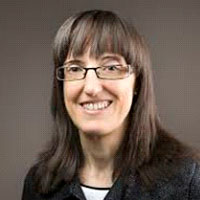 Susana Martín Leralta
Decana de la Facultad
Dean of the Faculty
Doctora por la Universidad de Bielefeld (Alemania) y Licenciada en Ciencias de la Información por la Universidad Complutense de Madrid. Acreditada. Su tesis doctoral obtuvo el Premio de Investigación ASELE 2008. Ha coordinado el Master en Lingüística aplicada a la enseñanza de español como lengua extranjera en la Universidad Nebrija durante siete años, es profesora de postgrado de esta Universidad y colaboradora habitual de otras instituciones. Sus líneas de investigación son la competencia estratégica, la comprensión auditiva y la evaluación. Ha publicado el libro Competencia estratégica para la comprensión auditiva en español como lengua extranjera (2009), el material didáctico Todo oídos (2011) y su Guía didáctica (2012), y diversos artículos.
Susana Martín Leralta
Decana de la Facultad
Dean of the Faculty
Doctora por la Universidad de Bielefeld (Alemania) y Licenciada en Ciencias de la Información por la Universidad Complutense de Madrid. Acreditada. Su tesis doctoral obtuvo el Premio de Investigación ASELE 2008. Ha coordinado el Master en Lingüística aplicada a la enseñanza de español como lengua extranjera en la Universidad Nebrija durante siete años, es profesora de postgrado de esta Universidad y colaboradora habitual de otras instituciones. Sus líneas de investigación son la competencia estratégica, la comprensión auditiva y la evaluación. Ha publicado el libro Competencia estratégica para la comprensión auditiva en español como lengua extranjera (2009), el material didáctico Todo oídos (2011) y su Guía didáctica (2012), y diversos artículos.
smartinl@nebrija.es
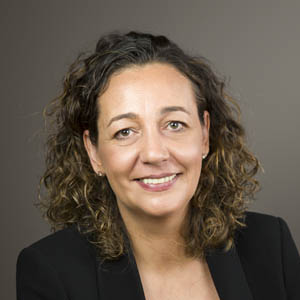 Nuria Camuñas Paulete
Directora del Departamento de Educación
Director of the Department of Education
Doctora en Psicología por la UCM. Acreditada. Máster en Intervención en la Ansiedad y el Estrés (UCM). Licenciada con grado en Psicología (UCM). Directora del Departamento de Educación, Facultad de Lenguas y Educación. Profesora de grado y postgrado en esa misma facultad. Docente de distintos cursos de formación y máster, sobre ansiedad, emociones y educación, estrés, modificación de conducta y dificultades del aprendizaje. Autora de distintas publicaciones y presentaciones en congresos relacionadas con procesos cognitivos, emoción y educación, prevención y control del estrés, etc. Miembro del grupo de investigación CEDI (Cognición, Educación y Diferencias Individuales). Otras líneas de investigación: Cognición, Emoción, Salud y Educación.
Nuria Camuñas Paulete
Directora del Departamento de Educación
Director of the Department of Education
Doctora en Psicología por la UCM. Acreditada. Máster en Intervención en la Ansiedad y el Estrés (UCM). Licenciada con grado en Psicología (UCM). Directora del Departamento de Educación, Facultad de Lenguas y Educación. Profesora de grado y postgrado en esa misma facultad. Docente de distintos cursos de formación y máster, sobre ansiedad, emociones y educación, estrés, modificación de conducta y dificultades del aprendizaje. Autora de distintas publicaciones y presentaciones en congresos relacionadas con procesos cognitivos, emoción y educación, prevención y control del estrés, etc. Miembro del grupo de investigación CEDI (Cognición, Educación y Diferencias Individuales). Otras líneas de investigación: Cognición, Emoción, Salud y Educación.
ncamunas@nebrija.es
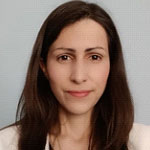 Victoria Eugenia Lamas Álvarez
Directora del Máster en Metodologías Docentes
Director of the Master’s Degree in Teaching Methodologies
Doctora en Filosofía por las Universidades de Valladolid y Salamanca. Máster en Formación del profesorado en la especialidad de Geografía e Historia obteniendo el premio extraordinario. Máster en Patrimonio Histórico: investigación y gestión por la UCLM; Licenciada en Historia del Arte (UVa). Acreditada por ANECA como Profesora Contratada Doctora y poseedora de un sexenio de investigación.
Actualmente desempeña su actividad como Directora del Máster en Metodologías Docentes, Profesora de grado y posgrado de la Facultad de Lenguas y Educación de la Universidad Nebrija.
Desarrolla su carrera docente desde 2016 en diversas Universidades en los ámbitos de Didáctica de las Ciencias Sociales y Didáctica de la Expresión Musical, en los Grados en Educación Infantil y Primaria; Innovación Docente en el Máster de Profesorado; Nuevas Tecnologías aplicadas a la Didáctica Musical y Didáctica de la Historia de la Música en la Mención en Educación Musical.
Becada por la Universidad C. San Pablo de Arequipa (Perú) donde ha desarrollado diversas actividades docentes e investigadoras en torno a la Innovación docente y la Didáctica del Patrimonio Cultural (2020-2022).
Autora de distintas publicaciones y presentaciones en congresos relacionadas con innovación docente, nuevas metodologías para el ecosistema digital educativo y didáctica del patrimonio cultural. En el ámbito de la innovación y ecosistema digital, se destaca la publicación “Digital Content Creation Tools: American University Teachers’ Perception” (Applied Sciences); y en el de la didáctica, ha publicado recientemente la monografía “El mensaje de la obra de arte en los museos. Una propuesta de redefinición del mundo del arte desde la didáctica” (Ed. Octaedro).
Victoria Eugenia Lamas Álvarez
Directora del Máster en Metodologías Docentes
Director of the Master’s Degree in Teaching Methodologies
Doctora en Filosofía por las Universidades de Valladolid y Salamanca. Máster en Formación del profesorado en la especialidad de Geografía e Historia obteniendo el premio extraordinario. Máster en Patrimonio Histórico: investigación y gestión por la UCLM; Licenciada en Historia del Arte (UVa). Acreditada por ANECA como Profesora Contratada Doctora y poseedora de un sexenio de investigación.
Actualmente desempeña su actividad como Directora del Máster en Metodologías Docentes, Profesora de grado y posgrado de la Facultad de Lenguas y Educación de la Universidad Nebrija.
Desarrolla su carrera docente desde 2016 en diversas Universidades en los ámbitos de Didáctica de las Ciencias Sociales y Didáctica de la Expresión Musical, en los Grados en Educación Infantil y Primaria; Innovación Docente en el Máster de Profesorado; Nuevas Tecnologías aplicadas a la Didáctica Musical y Didáctica de la Historia de la Música en la Mención en Educación Musical.
Becada por la Universidad C. San Pablo de Arequipa (Perú) donde ha desarrollado diversas actividades docentes e investigadoras en torno a la Innovación docente y la Didáctica del Patrimonio Cultural (2020-2022).
Autora de distintas publicaciones y presentaciones en congresos relacionadas con innovación docente, nuevas metodologías para el ecosistema digital educativo y didáctica del patrimonio cultural. En el ámbito de la innovación y ecosistema digital, se destaca la publicación “Digital Content Creation Tools: American University Teachers’ Perception” (Applied Sciences); y en el de la didáctica, ha publicado recientemente la monografía “El mensaje de la obra de arte en los museos. Una propuesta de redefinición del mundo del arte desde la didáctica” (Ed. Octaedro).
vlamas@nebrija.es
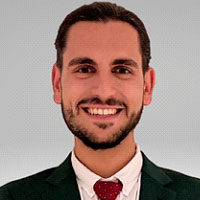 Pedro Antonio García-Tudela
Coordinador del Máster en Metodologías Docentes
Coordinator of the Master’s Degree in Teaching Methodologies
Doctor en Tecnología Educativa por la Universidad de Murcia (UM) con Mención Internacional (Universidad de Lisboa y Anti-Bullying Centre de la Dublin City University). Miembro del Grupo de Investigación en Tecnología Educativa de la UM y miembro de la red de investigación “Educación y tecnología Siglo XXI” de la Universidad Central del Ecuador. Hasta el momento, es (co)autor de una veintena de artículos científicos, algunos de ellos publicados en revistas de alto impacto académico, también ha participado en más de cuarenta congresos internacionales. Sus principales líneas de investigación son las metodologías activas enriquecidas con TIC: aprendizaje servicio, ABP, gamificación, ABJ, aula invertida, etc.; los entornos educativos emergentes: aulas del futuro, entornos inteligentes de aprendizaje, espacios maker, etc., y también, los recursos digitales y tecnologías avanzadas para la educación, como la inteligencia artificial, la robótica, la impresión 3D, la RA, la RV, entre otros. Por otro lado, ha participado en diferentes proyectos naciones e internacionales de investigación orientados al uso de las TIC para la potenciación de las soft skills; el desarrollo de la competencia de emprendimiento digital en estudiantes, y otros proyectos relacionados con la Competencia Digital. Por último, en cuanto a la innovación docente, ha recibido el premio SIMO 2023 a mejor proyecto TIC de educación inclusiva, igualdad y diversidad, y también, mejor acción de innovación 2023 por la UM.
Pedro Antonio García-Tudela
Coordinador del Máster en Metodologías Docentes
Coordinator of the Master’s Degree in Teaching Methodologies
Doctor en Tecnología Educativa por la Universidad de Murcia (UM) con Mención Internacional (Universidad de Lisboa y Anti-Bullying Centre de la Dublin City University). Miembro del Grupo de Investigación en Tecnología Educativa de la UM y miembro de la red de investigación “Educación y tecnología Siglo XXI” de la Universidad Central del Ecuador. Hasta el momento, es (co)autor de una veintena de artículos científicos, algunos de ellos publicados en revistas de alto impacto académico, también ha participado en más de cuarenta congresos internacionales. Sus principales líneas de investigación son las metodologías activas enriquecidas con TIC: aprendizaje servicio, ABP, gamificación, ABJ, aula invertida, etc.; los entornos educativos emergentes: aulas del futuro, entornos inteligentes de aprendizaje, espacios maker, etc., y también, los recursos digitales y tecnologías avanzadas para la educación, como la inteligencia artificial, la robótica, la impresión 3D, la RA, la RV, entre otros. Por otro lado, ha participado en diferentes proyectos naciones e internacionales de investigación orientados al uso de las TIC para la potenciación de las soft skills; el desarrollo de la competencia de emprendimiento digital en estudiantes, y otros proyectos relacionados con la Competencia Digital. Por último, en cuanto a la innovación docente, ha recibido el premio SIMO 2023 a mejor proyecto TIC de educación inclusiva, igualdad y diversidad, y también, mejor acción de innovación 2023 por la UM.
pgarcitu@nebrija.es
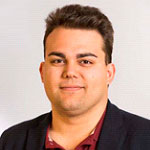 Javier Álvarez Otero
Profesor
Professor
Doctor en Educación por la Universidad Complutense de Madrid. Máster Universitario en Formación del Profesorado en Educación Secundaria Obligatoria y Bachillerato, Formación Profesional y Enseñanza de Idiomas. Licenciado en Historia.
Javier Álvarez Otero
Profesor
Professor
Doctor en Educación por la Universidad Complutense de Madrid. Máster Universitario en Formación del Profesorado en Educación Secundaria Obligatoria y Bachillerato, Formación Profesional y Enseñanza de Idiomas. Licenciado en Historia.
Es profesor de Educación Secundaria en las áreas de Geografía e Historia y Lengua Castellana y Literatura.
Además, ha sido investigador colaborador en el grupo de investigación Innovación didáctica para la enseñanza de la Geografía en el Marco del EEES (GEODIDAC) de la Universidad Complutense de Madrid y en el grupo de innovación docente (GID2017-10): Aprender empleando mapas en línea (MapsOnline).
Sus líneas de investigación se enfocan hacia la innovación educativa en la Didáctica de las Ciencias Sociales (métodos, estrategias y procesos), los Sistemas de Información Geográfica aplicados a la enseñanza de las CCSS, la evaluación por competencias y procesos de capacitación digital en CCSS y la sostenibilización curricular en la práctica docente en la enseñanza secundaria y universitaria.
Profesor universitario en Universidad Antonio de Nebrija y tutor de TFM.
jalvarezot@nebrija.es
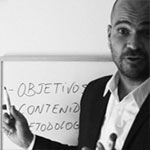 Iván Antúnez Garrido
Profesor
Professor
Licenciado en Pedagogía y Máster en Gestión de RR.HH. en la Empresa, es Técnico en orientación profesional para el empleo. Ha participado en diversos proyectos de investigación asociados a los departamentos de Teoría e Historia de la Educación, al de Métodos de Investigación y Diagnóstico en Educación (MIDE), así como al de Didáctica y Organización Educativa (DOE) de la Universidad de Sevilla; todos ellos relacionados con sus principales líneas de investigación y especialización profesional, como son las TIC aplicadas a la educación; la gestión de Recursos Humanos; el desarrollo y capacitación profesional y las habilidades sociolaborales.
Iván Antúnez Garrido
Profesor
Professor
Licenciado en Pedagogía y Máster en Gestión de RR.HH. en la Empresa, es Técnico en orientación profesional para el empleo. Ha participado en diversos proyectos de investigación asociados a los departamentos de Teoría e Historia de la Educación, al de Métodos de Investigación y Diagnóstico en Educación (MIDE), así como al de Didáctica y Organización Educativa (DOE) de la Universidad de Sevilla; todos ellos relacionados con sus principales líneas de investigación y especialización profesional, como son las TIC aplicadas a la educación; la gestión de Recursos Humanos; el desarrollo y capacitación profesional y las habilidades sociolaborales.
Además, posee más de 20 años de experiencia como docente, tanto en centros e instituciones educativas públicas y privadas, además de en empresas asociadas a las áreas de conocimiento.
iantunez@nebrija.es
 Guillermo Buedo Company
Profesor
Professor
Maestro de Primaria y Educación Física desde 2007 en la ciudad de Valencia, amante de las metodologías activas, ABP, gamificación y del aprendizaje basado en el juego.
Actualmente trabaja en el CEFIRE de Valencia, formando al profesorado y sacando el máximo partido de recursos educativos en el aula.
Autor del libro "deXPierta: crea tu propia metodología". Ha sido nominado a Mejor Docente de España en el año 2021 en los premios Educa Abanca.
Ha sido además ponente en diversos eventos educativos, el último de ellos "Enséñate 2023" en Sevilla.
Su pasión por la innovación docente le ha llevado a ser colaborador oficial de Sandbox Educación.
Guillermo Buedo Company
Profesor
Professor
Maestro de Primaria y Educación Física desde 2007 en la ciudad de Valencia, amante de las metodologías activas, ABP, gamificación y del aprendizaje basado en el juego.
Actualmente trabaja en el CEFIRE de Valencia, formando al profesorado y sacando el máximo partido de recursos educativos en el aula.
Autor del libro "deXPierta: crea tu propia metodología". Ha sido nominado a Mejor Docente de España en el año 2021 en los premios Educa Abanca.
Ha sido además ponente en diversos eventos educativos, el último de ellos "Enséñate 2023" en Sevilla.
Su pasión por la innovación docente le ha llevado a ser colaborador oficial de Sandbox Educación.
https://www.instagram.com/guille_buedo/?hl=es - https://linktr.ee/guille_buedo
gbuedo@nebrija.es
 Ibán de la Horra Villacé
Profesor
Professor
Licenciado en Astrofísica por la Universidad de La Laguna. Máster Universitario en Estrategias y Tecnologías para la Función Docente en la Sociedad Multicultural por la UNED. Profesor de ESO/Bachillerato en el Colegio San Agustín (Valladolid). Formador de docentes en metodologías interactivas y herramientas TIC, especializado en Realidad Extendida, Impresión 3D, Inteligencia Artificial y Drónica Didáctica. Embajador y coordinador en España de la Red Educativa Mundial (REDEM). Miembro del Parlamento Mundial de Educación. Fundador del proyecto CITECMAT enfocado en la divulgación de proyectos TIC y plataforma de formación docente.
Ibán de la Horra Villacé
Profesor
Professor
Licenciado en Astrofísica por la Universidad de La Laguna. Máster Universitario en Estrategias y Tecnologías para la Función Docente en la Sociedad Multicultural por la UNED. Profesor de ESO/Bachillerato en el Colegio San Agustín (Valladolid). Formador de docentes en metodologías interactivas y herramientas TIC, especializado en Realidad Extendida, Impresión 3D, Inteligencia Artificial y Drónica Didáctica. Embajador y coordinador en España de la Red Educativa Mundial (REDEM). Miembro del Parlamento Mundial de Educación. Fundador del proyecto CITECMAT enfocado en la divulgación de proyectos TIC y plataforma de formación docente.
ihorra@nebrija.es
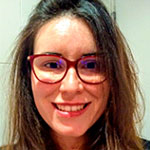 Irene Diego Rodríguez
Profesora
Professor
Doctorado Internacional en Lenguas Modernas por la Universidad de Alcalá. Obtuvo el Máster en Estudios Medievales en la Universidad de Glasgow, el Máster en Formación del Profesorado de ESO, Bachillerato, Formación Profesional y Enseñanza de Idiomas en la Universidad de Alcalá y una Licenciatura en Filología Inglesa en la Universidad de Zaragoza. Ha sido investigadora visitante en la Universidad de Glasgow y en diferentes bibliotecas de Londres, Oxford y Cambridge. Entre sus intereses de investigación se encuentran la lingüística histórica, la literatura medieval, los manuscritos medievales y la paleografía. Ha sido ponente en numerosos congresos científicos y cuenta con diversas publicaciones científicas en revistas de investigación y volúmenes académicos.
Irene Diego Rodríguez
Profesora
Professor
Doctorado Internacional en Lenguas Modernas por la Universidad de Alcalá. Obtuvo el Máster en Estudios Medievales en la Universidad de Glasgow, el Máster en Formación del Profesorado de ESO, Bachillerato, Formación Profesional y Enseñanza de Idiomas en la Universidad de Alcalá y una Licenciatura en Filología Inglesa en la Universidad de Zaragoza. Ha sido investigadora visitante en la Universidad de Glasgow y en diferentes bibliotecas de Londres, Oxford y Cambridge. Entre sus intereses de investigación se encuentran la lingüística histórica, la literatura medieval, los manuscritos medievales y la paleografía. Ha sido ponente en numerosos congresos científicos y cuenta con diversas publicaciones científicas en revistas de investigación y volúmenes académicos.
idiego@nebrija.es
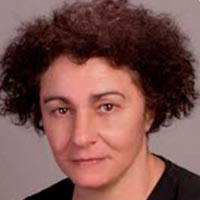 Miguela Domingo Centeno
Profesora
Professor
Doctora en CC. De la Educación y Filosofía por la UCM, con premio extraordinario y publicación de Tesis. Doctoranda en Derecho, Bioética, Biotecnología y DDHH en la UCM y Doctora por la Pontificia de Chile. Desde 2008-2012 Decana de la Univ. De la Salle. Posteriormente, Profesora de la Universidad Internacional de la Rioja, en curso. Desde 2019 colaboradora de Máster, asignaturas varias y TFG,s, en la Universidad de Nebrija. Miembro de Tribunales. Varios Máster en su haber, entre los cuales, Innovación Pedagógica, Investigación en entornos educativos, … y Especialista con Mención de Honor en un doble máster de Pedagogía terapéutica y Psicobiología. Especialidad en atención a la Diversidad, trastornos del comportamiento, dificultades de aprendizaje, siendo una de sus líneas de investigación las Necesidades Educativas Especiales y de Aprendizaje Educativo. Miembro de la Organización en Nantes sobre Resiliencia. Contratada Doctora y Universidad Privada desde 2004. Numerosos artículos y Congresos, este último año sobre psicología, atención temprana, nee, …
Miguela Domingo Centeno
Profesora
Professor
Doctora en CC. De la Educación y Filosofía por la UCM, con premio extraordinario y publicación de Tesis. Doctoranda en Derecho, Bioética, Biotecnología y DDHH en la UCM y Doctora por la Pontificia de Chile. Desde 2008-2012 Decana de la Univ. De la Salle. Posteriormente, Profesora de la Universidad Internacional de la Rioja, en curso. Desde 2019 colaboradora de Máster, asignaturas varias y TFG,s, en la Universidad de Nebrija. Miembro de Tribunales. Varios Máster en su haber, entre los cuales, Innovación Pedagógica, Investigación en entornos educativos, … y Especialista con Mención de Honor en un doble máster de Pedagogía terapéutica y Psicobiología. Especialidad en atención a la Diversidad, trastornos del comportamiento, dificultades de aprendizaje, siendo una de sus líneas de investigación las Necesidades Educativas Especiales y de Aprendizaje Educativo. Miembro de la Organización en Nantes sobre Resiliencia. Contratada Doctora y Universidad Privada desde 2004. Numerosos artículos y Congresos, este último año sobre psicología, atención temprana, nee, …
 Belinda Domingo Gómez
Profesora
Professor
Maestra, Psicopedagoga, he realizado los másteres de Tratamiento Educativo de la Diversidad y Logopedia. Doctora en Organización Escolar y Didácticas Especiales, con mención Cum Laude y Premio Extraordinario. Ha participado como miembro de Tribunales de Evaluación en las defensas de los Trabajos de fin de Grado en las titulaciones de Educación Infantil y Primaria, y másteres de Educación en la Universidad Internacional de la Rioja.
Ha trabajado impartiendo diversas asignaturas en distintas universidades y actualmente es profesora del Máster en Metodologías Docentes y Tutora de Trabajos de Fin de Máster en la Universidad de Nebrija. Forma parte del Grupo de Investigación EDUCALIDAD, de la Universidad de Castilla-La Mancha. Ha participado en diversos Congresos y dispone de publicaciones en libros y revistas científicas de educación.
Belinda Domingo Gómez
Profesora
Professor
Maestra, Psicopedagoga, he realizado los másteres de Tratamiento Educativo de la Diversidad y Logopedia. Doctora en Organización Escolar y Didácticas Especiales, con mención Cum Laude y Premio Extraordinario. Ha participado como miembro de Tribunales de Evaluación en las defensas de los Trabajos de fin de Grado en las titulaciones de Educación Infantil y Primaria, y másteres de Educación en la Universidad Internacional de la Rioja.
Ha trabajado impartiendo diversas asignaturas en distintas universidades y actualmente es profesora del Máster en Metodologías Docentes y Tutora de Trabajos de Fin de Máster en la Universidad de Nebrija. Forma parte del Grupo de Investigación EDUCALIDAD, de la Universidad de Castilla-La Mancha. Ha participado en diversos Congresos y dispone de publicaciones en libros y revistas científicas de educación.
bdomingo@nebrija.es
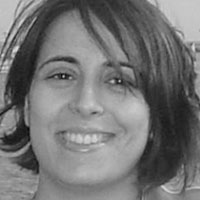 Marta Elena Domínguez Milanés
Profesora
Professor
Licenciada en Psicología (UCM), Doctora Cum Laude en Psicología (UAM), con postgrados en Recursos Humanos, tales como Experto en Recursos Humanos y Administración de Empresas (UCM), Curso Superior en Dirección Estratégica de RRHH (IE), Curso Superior en Asesoría Laboral (IE), Curso Superior en Políticas Retributivas (UCM) y Curso Superior en Gestión de la Formación (COP). Colegiada y en activo desde 2002, con más de 25 años de experiencia profesional y docente. Gran parte de su trayectoria profesional la ha desarrollado en diferentes empresas nacionales e internacionales en entornos educativos y empresariales (RRHH, Desarrollo, Talento, Selección, Bienestar Laboral y Psicología).
Además, ha impartido docencia de grado y postgrado durante más de 15 años en diferentes universidades y escuelas de negocio, tanto en inglés como en español, en ADE, Psicología y Magisterio. Como complemento ha colaborado con algunas empresas como consultora nacional e internacional en desarrollo de nuevas tecnologías de docencia en soft skills.
Su vida profesional ha girado siempre alrededor de la Psicología y la formación, trabajando en diferentes ámbitos: Psicología, educación, RRHH, metodologías, aprendizaje, desarrollo, talento, habilidades directivas y de gestión personal. Actualmente es docente de grado y postgrado en diferentes escuelas y universidades en las áreas citadas anteriormente y colabora con diferentes proyectos de consultoría e investigación en las áreas de metodologías docentes, RRHH, burnout, satisfacción laboral y riesgos psicosociales.
Marta Elena Domínguez Milanés
Profesora
Professor
Licenciada en Psicología (UCM), Doctora Cum Laude en Psicología (UAM), con postgrados en Recursos Humanos, tales como Experto en Recursos Humanos y Administración de Empresas (UCM), Curso Superior en Dirección Estratégica de RRHH (IE), Curso Superior en Asesoría Laboral (IE), Curso Superior en Políticas Retributivas (UCM) y Curso Superior en Gestión de la Formación (COP). Colegiada y en activo desde 2002, con más de 25 años de experiencia profesional y docente. Gran parte de su trayectoria profesional la ha desarrollado en diferentes empresas nacionales e internacionales en entornos educativos y empresariales (RRHH, Desarrollo, Talento, Selección, Bienestar Laboral y Psicología).
Además, ha impartido docencia de grado y postgrado durante más de 15 años en diferentes universidades y escuelas de negocio, tanto en inglés como en español, en ADE, Psicología y Magisterio. Como complemento ha colaborado con algunas empresas como consultora nacional e internacional en desarrollo de nuevas tecnologías de docencia en soft skills.
Su vida profesional ha girado siempre alrededor de la Psicología y la formación, trabajando en diferentes ámbitos: Psicología, educación, RRHH, metodologías, aprendizaje, desarrollo, talento, habilidades directivas y de gestión personal. Actualmente es docente de grado y postgrado en diferentes escuelas y universidades en las áreas citadas anteriormente y colabora con diferentes proyectos de consultoría e investigación en las áreas de metodologías docentes, RRHH, burnout, satisfacción laboral y riesgos psicosociales.
mdominguezmi@nebrija.es
 Sergio Edú
Profesor
Professor
Doctor en Psicología por la UNED en la especialidad de Psicología del Trabajo y las Organizaciones. Sus trabajos de investigación han sido publicados por prestigiosas revistas y se centran en analizar la influencia del Liderazgo Auténtico y procesos intervinientes en las Conductas Extra-Rol de los empleados. Así mismo es autor de varios capítulos de libros. Su experiencia profesional en el ámbito de la docencia se inicia en el 2006 como formador in Company, desde entonces su ámbito de actuación ha ido ampliándose y en la actualidad desempeña la actividad docente en varias universidades, escuelas de negocio y organizaciones privadas.
Sergio Edú
Profesor
Professor
Doctor en Psicología por la UNED en la especialidad de Psicología del Trabajo y las Organizaciones. Sus trabajos de investigación han sido publicados por prestigiosas revistas y se centran en analizar la influencia del Liderazgo Auténtico y procesos intervinientes en las Conductas Extra-Rol de los empleados. Así mismo es autor de varios capítulos de libros. Su experiencia profesional en el ámbito de la docencia se inicia en el 2006 como formador in Company, desde entonces su ámbito de actuación ha ido ampliándose y en la actualidad desempeña la actividad docente en varias universidades, escuelas de negocio y organizaciones privadas.
sedu@nebrija.es
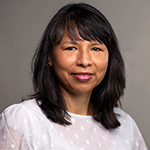 Sulma Farfán Sossa
Profesora
Professor
Doctora Cum laude en Educación con Premio Extraordinario de Doctorado por la Universidad Nacional de Educación a Distancia (UNED). Licenciada en Informática por la Universidad Mayor de San Andrés-Bolivia. Cuenta con acreditación de la ANECA. Ha cursado los siguientes Maestrias: Ingénierie des Médias pour l’Education-Université de Poitiers-Francia, Ciencias de la Educación. Especialidad Tecnología Educativa-Universidad Técnica de Lisboa-Portugal, Informática Educativa-UNED-España, Ingeniería Informática-Universidad Autónoma Juan Misael Saracho(UAJMS)-Bolivia. Ha sido directora de diversos proyectos de innovación universitaria basados en las TIC y organizadora de diversos congresos y seminarios internacionales relacionados con TIC, Educación y Ciberdelitos. Ha dirigido proyectos tecnológicos en el ámbito de la educación superior a nivel nacional en Bolivia. Ha sido profesora titular de la carrera de Informática en la UAJMS-Bolivia y ha impartido docencia en el Master de Tecnologías para la Educación y el Conocimiento. UNED-España (2010-2012). Ha sido Asesora en Tecnología educativa y Evaluación universitaria en la Saint Louis University Madrid Campus (2007-2020). Ha recibido diversos premios y reconocimientos por su labor en favor de la educación en Bolivia. Colabora como juez externo con las revistas: CEPAL, RAIA-UAI-Argentina y SUMA- UST-Chile.
Sulma Farfán Sossa
Profesora
Professor
Doctora Cum laude en Educación con Premio Extraordinario de Doctorado por la Universidad Nacional de Educación a Distancia (UNED). Licenciada en Informática por la Universidad Mayor de San Andrés-Bolivia. Cuenta con acreditación de la ANECA. Ha cursado los siguientes Maestrias: Ingénierie des Médias pour l’Education-Université de Poitiers-Francia, Ciencias de la Educación. Especialidad Tecnología Educativa-Universidad Técnica de Lisboa-Portugal, Informática Educativa-UNED-España, Ingeniería Informática-Universidad Autónoma Juan Misael Saracho(UAJMS)-Bolivia. Ha sido directora de diversos proyectos de innovación universitaria basados en las TIC y organizadora de diversos congresos y seminarios internacionales relacionados con TIC, Educación y Ciberdelitos. Ha dirigido proyectos tecnológicos en el ámbito de la educación superior a nivel nacional en Bolivia. Ha sido profesora titular de la carrera de Informática en la UAJMS-Bolivia y ha impartido docencia en el Master de Tecnologías para la Educación y el Conocimiento. UNED-España (2010-2012). Ha sido Asesora en Tecnología educativa y Evaluación universitaria en la Saint Louis University Madrid Campus (2007-2020). Ha recibido diversos premios y reconocimientos por su labor en favor de la educación en Bolivia. Colabora como juez externo con las revistas: CEPAL, RAIA-UAI-Argentina y SUMA- UST-Chile.
sfarfan@nebrija.es
 Marcos Garasa
Profesor
Professor
Licenciado en filología inglesa actualmente trabaja como Director de innovación y TIC y responsable de formación en el Colegio internacional J.H. Newman donde persigue sus intereses en la educación; fomentar en las personas la creatividad y la curiosidad, a preguntarse no tanto "qué es eso" sino "por qué es eso" y “cómo integrarlo”. Investiga en la línea de marcos de competencia digital para el desarrollo de perfiles de alumno y docente. Vinculado a varios másteres universitarios con asignaturas que buscan la integración de pedagogías activas, competencias digitales, innovación y TIC aplicadas. En sus años como docente en asignaturas de inglés y lengua castellana, ha compaginado la coordinación de departamentos de idiomas en centros bilingües, una etapa de secundaria y uno de los 10 primeros proyectos con dispositivos móviles 1:1 en España. Co Diseñando con INTEF la primera edición del programa smart schools de Samsung. Ha liderado, coordinado y desarrollado programas de desarrollo profesional y asesoría de proyectos tecnológicos en centros educativos con un enfoque de mejora de la práctica docente desde las metodologías activas. Cuenta además con certificaciones y experiencia como Google certified trainer, Microsoft innovative educator, Symbaloo ambassador, Samsung teacher trainer y Apple distinguished educator.
Marcos Garasa
Profesor
Professor
Licenciado en filología inglesa actualmente trabaja como Director de innovación y TIC y responsable de formación en el Colegio internacional J.H. Newman donde persigue sus intereses en la educación; fomentar en las personas la creatividad y la curiosidad, a preguntarse no tanto "qué es eso" sino "por qué es eso" y “cómo integrarlo”. Investiga en la línea de marcos de competencia digital para el desarrollo de perfiles de alumno y docente. Vinculado a varios másteres universitarios con asignaturas que buscan la integración de pedagogías activas, competencias digitales, innovación y TIC aplicadas. En sus años como docente en asignaturas de inglés y lengua castellana, ha compaginado la coordinación de departamentos de idiomas en centros bilingües, una etapa de secundaria y uno de los 10 primeros proyectos con dispositivos móviles 1:1 en España. Co Diseñando con INTEF la primera edición del programa smart schools de Samsung. Ha liderado, coordinado y desarrollado programas de desarrollo profesional y asesoría de proyectos tecnológicos en centros educativos con un enfoque de mejora de la práctica docente desde las metodologías activas. Cuenta además con certificaciones y experiencia como Google certified trainer, Microsoft innovative educator, Symbaloo ambassador, Samsung teacher trainer y Apple distinguished educator.
mgarasa@nebrija.es
 Felipe García Gaitero
Profesor
Professor
Doctor en Ciencias de la Educación por la Universidad Camilo José Cela con una tesis centrada en el uso de la Gamificación en los procesos de Enseñanza y Aprendizaje. Máster en Formación del Profesorado en la especialidad de Matemáticas. Graduado en Ingeniería Informática por la Universidad Católica de Murcia. Ingeniero Informático en la especialidad de Gestión Empresarial por la Universidad Pontificia de Salamanca. Profesor Universitario Experto en Tecnología educativa, videojuegos y nuevas metodologías docentes y didácticas de asignaturas STEM (Science, Technology, Engineering, Maths). Ha desarrollado una larga trayectoria profesional en Consultoría Informática colaborando en proyectos de importantes firmas y sectores como Banca, Delivery y Educación entre otros.
Felipe García Gaitero
Profesor
Professor
Doctor en Ciencias de la Educación por la Universidad Camilo José Cela con una tesis centrada en el uso de la Gamificación en los procesos de Enseñanza y Aprendizaje. Máster en Formación del Profesorado en la especialidad de Matemáticas. Graduado en Ingeniería Informática por la Universidad Católica de Murcia. Ingeniero Informático en la especialidad de Gestión Empresarial por la Universidad Pontificia de Salamanca. Profesor Universitario Experto en Tecnología educativa, videojuegos y nuevas metodologías docentes y didácticas de asignaturas STEM (Science, Technology, Engineering, Maths). Ha desarrollado una larga trayectoria profesional en Consultoría Informática colaborando en proyectos de importantes firmas y sectores como Banca, Delivery y Educación entre otros.
fgarciaga@nebrija.es
 Sandra García Martín
Profesora
Professor
Profesora de Nuevos roles, entornes y modalidades de la educación del siglo XXI y directora de TFM del Máster de metodologías Docentes de la Universidad de Nebrija en la Facultad de Lenguas y Educación.
Maestra en Educación Infantil y Primaria, especialista en pedagogía terapéutica. Máster en Prevención e Intervención Psicológica en Problemas de Conducta en la Escuela, en la Especialidad en terapia familiar.
Experiencia como educadora en escuelas y centros de educación infantil.
Su campo de investigación abarca los beneficios de la Arteterapia en alumnado con necesidades educativas especiales, la educación emocional y el análisis del dibujo infantil.
Sandra García Martín
Profesora
Professor
Profesora de Nuevos roles, entornes y modalidades de la educación del siglo XXI y directora de TFM del Máster de metodologías Docentes de la Universidad de Nebrija en la Facultad de Lenguas y Educación.
Maestra en Educación Infantil y Primaria, especialista en pedagogía terapéutica. Máster en Prevención e Intervención Psicológica en Problemas de Conducta en la Escuela, en la Especialidad en terapia familiar.
Experiencia como educadora en escuelas y centros de educación infantil.
Su campo de investigación abarca los beneficios de la Arteterapia en alumnado con necesidades educativas especiales, la educación emocional y el análisis del dibujo infantil.
sgarcmar@nebrija.es
 Esther González Castellón
Profesora
Professor
Doctora en Ciencias de la Educación (2017) por la Universidad de Granada. Licenciada en Psicopedagogía (2011) por la Universidad de Granada, Diplomada en Educación Infantil y Física. Máster de doble titulación y Excelencia Europea por la universidad de Granada y de Bolonia (Italia), “Gender studies”. En cuanto a la actividad docente he sido Profesora en la Universidad de Granada (departamento de Psicología Experimental). En dicha actividad docente me avalan unos resultados de las encuestas al alumnado con una media de Sobresaliente en las asignaturas impartidas. Ha dirigido en lo que lleva de docencia unos 60 TFM y 20 TFG hasta el 2020.
Esther González Castellón
Profesora
Professor
Doctora en Ciencias de la Educación (2017) por la Universidad de Granada. Licenciada en Psicopedagogía (2011) por la Universidad de Granada, Diplomada en Educación Infantil y Física. Máster de doble titulación y Excelencia Europea por la universidad de Granada y de Bolonia (Italia), “Gender studies”. En cuanto a la actividad docente he sido Profesora en la Universidad de Granada (departamento de Psicología Experimental). En dicha actividad docente me avalan unos resultados de las encuestas al alumnado con una media de Sobresaliente en las asignaturas impartidas. Ha dirigido en lo que lleva de docencia unos 60 TFM y 20 TFG hasta el 2020.
egonzalezca@nebrija.es
 Patricia González Collado
Profesora
Professor
Doctora en Educación por la Universidad Autónoma de Madrid con mención Cum Laude. Graduada en Pedagogía por la Universidad de Oviedo y Máster en Calidad y mejora de la Educación por la Universidad Autónoma de Madrid. Su principal línea de investigación está centrada en la Pedagogía de la Muerte en el contexto educativo y hospitalario. Es investigadora en proyectos I+D+I como “Innovación e Inclusión de la Muerte en Educación” y “Pedagogía, Pandemia y Mejora de la Educación” (Ministerio de Ciencia e Innovación). Co-autora de los libros “La práctica de la pedagogía de la muerte: Guía Educativa y Plan Lector”. Ha presentado diversas comunicaciones y ponencias en Congresos Educativos. Actualmente, es Directora del Máster en Dirección y Transformación Digital de Centros Educativos y del Máster en Gobernanza Educativa en la Universidad Antonio de Nebrija. También es docente en el Máster Universitario en Formación del Profesorado de ESO y Bachillerato, FP y Enseñanza de Idiomas (Universidad Antonio de Nebrija).
Patricia González Collado
Profesora
Professor
Doctora en Educación por la Universidad Autónoma de Madrid con mención Cum Laude. Graduada en Pedagogía por la Universidad de Oviedo y Máster en Calidad y mejora de la Educación por la Universidad Autónoma de Madrid. Su principal línea de investigación está centrada en la Pedagogía de la Muerte en el contexto educativo y hospitalario. Es investigadora en proyectos I+D+I como “Innovación e Inclusión de la Muerte en Educación” y “Pedagogía, Pandemia y Mejora de la Educación” (Ministerio de Ciencia e Innovación). Co-autora de los libros “La práctica de la pedagogía de la muerte: Guía Educativa y Plan Lector”. Ha presentado diversas comunicaciones y ponencias en Congresos Educativos. Actualmente, es Directora del Máster en Dirección y Transformación Digital de Centros Educativos y del Máster en Gobernanza Educativa en la Universidad Antonio de Nebrija. También es docente en el Máster Universitario en Formación del Profesorado de ESO y Bachillerato, FP y Enseñanza de Idiomas (Universidad Antonio de Nebrija).
pgonzalezco@nebrija.es
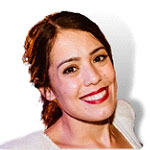 Macarena M. González Gómez
Profesora
Professor
Profesora de Estrategias y Recursos metodológicos del profesorado, Evaluación de las metodologías docentes, y directora de TFM del Master Universitario de Metodologías Docentes (MUMDO) de la Universidad de Nebrija en la Facultad de Lenguas y Educación. Docente de Ciencias Sociales: Geografía, Historia e Historia del Arte (Secundaria y Bachillerato), máster en educación y nuevas tecnologías (ULL), máster en Patrimonio Artístico Andaluz y su Proyección Iberoamericana (US). Especialista en Flipped Learning y su aplicación en el aula y nuevas metodologías apoyadas en las TIC (exElearning, aprendizaje cooperativo… etc) por diversas instituciones. Especialista en el paradigma del Diseño Universal de Aprendizaje (DUA). Es graduada en periodismo por la Universidad de Sevilla, técnica superior en Producción audiovisual radio y espectáculos; en el entorno público-privado de la comunicación tiene una larga trayectoria en la gestión y organización de eventos, ha trabajado para distintos organismos de la Junta de Andalucía. Actualmente es responsable del gabinete de comunicación del Consejo Social de la Universidad de Sevila.
Macarena M. González Gómez
Profesora
Professor
Profesora de Estrategias y Recursos metodológicos del profesorado, Evaluación de las metodologías docentes, y directora de TFM del Master Universitario de Metodologías Docentes (MUMDO) de la Universidad de Nebrija en la Facultad de Lenguas y Educación. Docente de Ciencias Sociales: Geografía, Historia e Historia del Arte (Secundaria y Bachillerato), máster en educación y nuevas tecnologías (ULL), máster en Patrimonio Artístico Andaluz y su Proyección Iberoamericana (US). Especialista en Flipped Learning y su aplicación en el aula y nuevas metodologías apoyadas en las TIC (exElearning, aprendizaje cooperativo… etc) por diversas instituciones. Especialista en el paradigma del Diseño Universal de Aprendizaje (DUA). Es graduada en periodismo por la Universidad de Sevilla, técnica superior en Producción audiovisual radio y espectáculos; en el entorno público-privado de la comunicación tiene una larga trayectoria en la gestión y organización de eventos, ha trabajado para distintos organismos de la Junta de Andalucía. Actualmente es responsable del gabinete de comunicación del Consejo Social de la Universidad de Sevila.
mgonzalezgo@nebrija.es
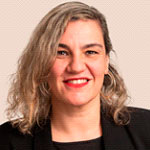 Paola Guimeráns Sánchez
Profesora
Professor
Doctora por la Universidad Complutense de Madrid. Máster en Innovación Educativa por la Universidad Europea y Máster en Diseño y Tecnología por la Parsons School de Nueva York. Especialista en enseñanzas STEAM y robótica educativa. Su principal línea de trabajo se basa en desarrollar metodologías pedagógicas innovadoras en la educación a través de los e-textiles para la enseñanza de las Ciencias de la Computación. Desde hace más de una década trabaja como asesora en innovación educativa. Es la autora de la plataforma de recursos tecnológicos “PrototipadoLAB” y la impulsora de la iniciativa educativa “Aula STEAM”. Ha impartido en el ámbito nacional e internacional numerosas conferencias.
Paola Guimeráns Sánchez
Profesora
Professor
Doctora por la Universidad Complutense de Madrid. Máster en Innovación Educativa por la Universidad Europea y Máster en Diseño y Tecnología por la Parsons School de Nueva York. Especialista en enseñanzas STEAM y robótica educativa. Su principal línea de trabajo se basa en desarrollar metodologías pedagógicas innovadoras en la educación a través de los e-textiles para la enseñanza de las Ciencias de la Computación. Desde hace más de una década trabaja como asesora en innovación educativa. Es la autora de la plataforma de recursos tecnológicos “PrototipadoLAB” y la impulsora de la iniciativa educativa “Aula STEAM”. Ha impartido en el ámbito nacional e internacional numerosas conferencias.
mguimera@nebrija.es
 Ángel C. Herrero Lastra
Profesor
Professor
Responsable de materias para la Enseñanza y Aprendizaje de Matemáticas, Tecnologías Industriales y Tecnología Informática, impartidas en titulaciones de Grado y Máster del Departamento de Educación de la Facultad de Lenguas y Educación de la Universidad Nebrija. Profesor en la especialidad de Matemáticas, Tecnología Industrial y Economía, Empresa y Comercio, del Máster Universitario de Formación de Profesorado de la Universidad Nebrija y docente en el IES Los Sauces en Benavente (Zamora), en la especialidad de Electricidad y Electrónica. Miembro del grupo de investigación Intelligent Networks and Information Technologies (iNiT). Doctorando en Ingeniería de Sistemas e Informática en la Universidad de Zaragoza, especialidad Industria 4.0. Ingeniero Superior Industrial por la Escuela Politécnica Superior de la Universidad Europea de Madrid (UEM) e Ingeniero Técnico Industrial por la Escuela Politécnica Superior de Zamora, Universidad de Salamanca (USAL). Desde 2007 desarrolla trabajos como Ingeniero Jefe de Proyectos de energías renovables, industria conectada, robótica y automatización industrial, tanto a nivel nacional como internacional. Presidente del Colegio Oficial de Ingenieros Industriales de Madrid COIIM – Delegación de Zamora, desde el año 2017. Herrero, A.C. et al. 2019. Medición de la eficiencia industrial mediante dispositivos de bajo coste. IV Jornadas de Computación Empotrada y Reconfigurable (JCER2019) Herrero, A.C. et al. 2020. An interference-resilient IIoT solution for measuring the effectiveness of industrial processes. IECON 2020
Ángel C. Herrero Lastra
Profesor
Professor
Responsable de materias para la Enseñanza y Aprendizaje de Matemáticas, Tecnologías Industriales y Tecnología Informática, impartidas en titulaciones de Grado y Máster del Departamento de Educación de la Facultad de Lenguas y Educación de la Universidad Nebrija. Profesor en la especialidad de Matemáticas, Tecnología Industrial y Economía, Empresa y Comercio, del Máster Universitario de Formación de Profesorado de la Universidad Nebrija y docente en el IES Los Sauces en Benavente (Zamora), en la especialidad de Electricidad y Electrónica. Miembro del grupo de investigación Intelligent Networks and Information Technologies (iNiT). Doctorando en Ingeniería de Sistemas e Informática en la Universidad de Zaragoza, especialidad Industria 4.0. Ingeniero Superior Industrial por la Escuela Politécnica Superior de la Universidad Europea de Madrid (UEM) e Ingeniero Técnico Industrial por la Escuela Politécnica Superior de Zamora, Universidad de Salamanca (USAL). Desde 2007 desarrolla trabajos como Ingeniero Jefe de Proyectos de energías renovables, industria conectada, robótica y automatización industrial, tanto a nivel nacional como internacional. Presidente del Colegio Oficial de Ingenieros Industriales de Madrid COIIM – Delegación de Zamora, desde el año 2017. Herrero, A.C. et al. 2019. Medición de la eficiencia industrial mediante dispositivos de bajo coste. IV Jornadas de Computación Empotrada y Reconfigurable (JCER2019) Herrero, A.C. et al. 2020. An interference-resilient IIoT solution for measuring the effectiveness of industrial processes. IECON 2020
aherrerola@nebrija.es
 Mónica Jimenez Astudillo
Profesora
Professor
Doctora en Ciencias de la Educación. Licenciada en Pedagogía; Máster en Educación Especial y Máster Universitario en Formación del Profesorado en la especialidad de orientación educativa. Cuenta con el postgrado experto en formación y Atención Temprana en contextos diversos y vulnerables por la Universidad Nacional de Educación a Distancia. Ha trabajado como jefe de estudios en colegio privado y cuenta con experiencia en el ámbito de la Atención Temprana realizando funciones de detección, evaluación e intervención en niños con trastornos en el neurodesarrollo y riesgo de padecerlos y el asesoramiento a sus familias. Sus líneas de investigación y publicaciones se focalizan en la Psicología del desarrollo las alteraciones y trastornos del neurodesarrollo el alto riesgo biopsicosocial y la atención a la primera infancia y sus familias. Miembro de la Comisión de Infancia y Adolescencia de la Comunidad de Madrid. Miembro de la Junta Directiva de APREM. Actualmente es la directora del Máster Universitario en Problemas de Conducta en Centros Educativos y del Máster Universitario en Atención a la Diversidad y Necesidades Educativas Especiales de la Universidad Nebrija.
Mónica Jimenez Astudillo
Profesora
Professor
Doctora en Ciencias de la Educación. Licenciada en Pedagogía; Máster en Educación Especial y Máster Universitario en Formación del Profesorado en la especialidad de orientación educativa. Cuenta con el postgrado experto en formación y Atención Temprana en contextos diversos y vulnerables por la Universidad Nacional de Educación a Distancia. Ha trabajado como jefe de estudios en colegio privado y cuenta con experiencia en el ámbito de la Atención Temprana realizando funciones de detección, evaluación e intervención en niños con trastornos en el neurodesarrollo y riesgo de padecerlos y el asesoramiento a sus familias. Sus líneas de investigación y publicaciones se focalizan en la Psicología del desarrollo las alteraciones y trastornos del neurodesarrollo el alto riesgo biopsicosocial y la atención a la primera infancia y sus familias. Miembro de la Comisión de Infancia y Adolescencia de la Comunidad de Madrid. Miembro de la Junta Directiva de APREM. Actualmente es la directora del Máster Universitario en Problemas de Conducta en Centros Educativos y del Máster Universitario en Atención a la Diversidad y Necesidades Educativas Especiales de la Universidad Nebrija.
mjimenezas@nebrija.es
 Beatriz Juárez Escribano
Profesora
Professor
Doctora Cum Laude por unanimidad en Publicidad y Relaciones Públicas, dentro del programa de Educación y Creatividad: Aplicaciones Tecnológicas, Sociales y Psicopedagógicas, por la Universidad Camilo José Cela, con la tesis "Las redes sociales virtuales como medios de comunicación de masas: autopercepción y comportamiento de los usuarios". Es doble licenciada en Comunicación Audiovisual y Ciencias Ambientales, y posee dos másteres: uno en Energías Renovables y Mercado Energético por la Escuela de Organización Industrial; y otro en Prevención de Riesgos Laborales por el Instituto Madrileño de Formación. Actualmente es profesora de la Facultad de Lenguas y Educación de la Universidad Antonio de Nebrija, impartiendo docente en el Máster de TUC para la Educación. También ha trabajado como coordinadora del Máster de Dirección de Empresas de Comunicación en la Escuela de Administración de Empresas. Además, ha realizado trabajos de producción y docencia en el sector audiovisual y de la comunicación para instituciones públicas y privadas durante varios años.
Beatriz Juárez Escribano
Profesora
Professor
Doctora Cum Laude por unanimidad en Publicidad y Relaciones Públicas, dentro del programa de Educación y Creatividad: Aplicaciones Tecnológicas, Sociales y Psicopedagógicas, por la Universidad Camilo José Cela, con la tesis "Las redes sociales virtuales como medios de comunicación de masas: autopercepción y comportamiento de los usuarios". Es doble licenciada en Comunicación Audiovisual y Ciencias Ambientales, y posee dos másteres: uno en Energías Renovables y Mercado Energético por la Escuela de Organización Industrial; y otro en Prevención de Riesgos Laborales por el Instituto Madrileño de Formación. Actualmente es profesora de la Facultad de Lenguas y Educación de la Universidad Antonio de Nebrija, impartiendo docente en el Máster de TUC para la Educación. También ha trabajado como coordinadora del Máster de Dirección de Empresas de Comunicación en la Escuela de Administración de Empresas. Además, ha realizado trabajos de producción y docencia en el sector audiovisual y de la comunicación para instituciones públicas y privadas durante varios años.
mjuareze@nebrija.es
 María Cruz Lachica González
Profesora
Professor
Doctora Acreditada (ANECA) en Filología Hispánica por la Universidad Complutense de Madrid, Máster en Derechos Humanos por la Universidad Carlos III de Madrid. Es autora del libro Narrativa de tradición oral maya tojolabal (Marcial Pons, 2017), cuenta con siete años de investigación en el extranjero, dos estancias posdoctorales, catorce publicaciones académicas, veintiuna publicaciones literarias y más de veinte conferencias en congresos internacionales. Ha sido profesora de Lengua Castellana y Literatura en ESO y Bachillerato. Sus temas de investigación se sitúan entre el campo de la educación, la literatura (especialmente de la tradición oral) y la antropología, aunque también ha explorado las fronteras entre la antropología y los derechos humanos.
María Cruz Lachica González
Profesora
Professor
Doctora Acreditada (ANECA) en Filología Hispánica por la Universidad Complutense de Madrid, Máster en Derechos Humanos por la Universidad Carlos III de Madrid. Es autora del libro Narrativa de tradición oral maya tojolabal (Marcial Pons, 2017), cuenta con siete años de investigación en el extranjero, dos estancias posdoctorales, catorce publicaciones académicas, veintiuna publicaciones literarias y más de veinte conferencias en congresos internacionales. Ha sido profesora de Lengua Castellana y Literatura en ESO y Bachillerato. Sus temas de investigación se sitúan entre el campo de la educación, la literatura (especialmente de la tradición oral) y la antropología, aunque también ha explorado las fronteras entre la antropología y los derechos humanos.
mlachica@nebrija.es
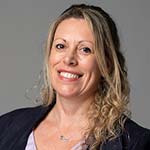 Claudia Liliana Gandía
Profesora
Professor
Doctora Cum laude en Nuevos Lenguajes de la Comunicación por la Universidad de La Laguna, con la tesis: "TIC, género e investigación científica: uso y percepciones de las investigadoras sobre las tecnologías de la información y la comunicación". Licenciada en Psicología por la Universidad Nacional de Córdoba (Argentina). Posgrado en Docencia Universitaria en el marco de la Maestría en Docencia Universitaria (Universidad Tecnológica Nacional). Actualmente es profesora en la Facultad de Lenguas y Educación de la Universidad Antonio de Nebrija, impartiendo docencia en el Máster de TIC para la Educación y aprendizaje digital y Coordinadora académica de alumnos del Máster Universitario en TIC para la Educación y el Aprendizaje Digital. Se ha desempeñado como Profesora e investigadora en la Universidad Nacional de Villa María (UNVM), Argentina. Líneas de investigación: Métodos y técnicas de investigación social-TIC-Sociología de los cuerpos y emociones. Ha ejercido el cargo de Directora de GESSYCO (Grupo de estudios Sociales sobre Subjetividades y Conflicto), ha dirigido y codirigido múltiples Proyectos de investigación y de Transferencia. Como así también el de Editora y Coordinadora general de los Documentos de Trabajo del CIES (Centro de Investigaciones y Estudios Sociológicos). Autora de libros y capítulos de libros sobre métodos y técnicas de investigación social e investigación, expresividad, creatividad, cuerpos y emociones. Directora de TFM en las líneas temáticas: TIC, Tecnologías educativas y competencias digitales, Neuropsicología y educación.
Claudia Liliana Gandía
Profesora
Professor
Doctora Cum laude en Nuevos Lenguajes de la Comunicación por la Universidad de La Laguna, con la tesis: "TIC, género e investigación científica: uso y percepciones de las investigadoras sobre las tecnologías de la información y la comunicación". Licenciada en Psicología por la Universidad Nacional de Córdoba (Argentina). Posgrado en Docencia Universitaria en el marco de la Maestría en Docencia Universitaria (Universidad Tecnológica Nacional). Actualmente es profesora en la Facultad de Lenguas y Educación de la Universidad Antonio de Nebrija, impartiendo docencia en el Máster de TIC para la Educación y aprendizaje digital y Coordinadora académica de alumnos del Máster Universitario en TIC para la Educación y el Aprendizaje Digital. Se ha desempeñado como Profesora e investigadora en la Universidad Nacional de Villa María (UNVM), Argentina. Líneas de investigación: Métodos y técnicas de investigación social-TIC-Sociología de los cuerpos y emociones. Ha ejercido el cargo de Directora de GESSYCO (Grupo de estudios Sociales sobre Subjetividades y Conflicto), ha dirigido y codirigido múltiples Proyectos de investigación y de Transferencia. Como así también el de Editora y Coordinadora general de los Documentos de Trabajo del CIES (Centro de Investigaciones y Estudios Sociológicos). Autora de libros y capítulos de libros sobre métodos y técnicas de investigación social e investigación, expresividad, creatividad, cuerpos y emociones. Directora de TFM en las líneas temáticas: TIC, Tecnologías educativas y competencias digitales, Neuropsicología y educación.
cgandia@nebrija.es
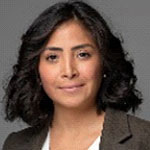 Montserrat Magro Gutierrez
Profesora
Professor
Directora Grado en Educación Primaria y Grado en Educación Infantil. Doctora en Educación por la Universidad Camilo José Cela (mención internacional); Máster en Pedagogía por la Universidad del Sur (Chiapas, México); Licenciada en Educación Preescolar por la Escuela Normal de Educadoras “Bertha Von Glummer y Leyva (Chiapas, México). Trabaja como personal docente en la Universidad Antonio de Nebrija y dirige los Grados de Educación Infantil y de Educación Primaria. A su vez, forma parte del Think Tank "EduSoC Lab: Educación, Sociedad y Cultura" de la Universidad Complutense de Madrid y del equipo editorial de la Revista Estilos de Aprendizaje (ISSN: 1988-8996) / Journal of Learning Styles (ISSN: 2332-8533), coordinada y editada por Edusoc Lab, en colaboración con UTAH Valley University y la Editorial Universitas. Ha sido docente de Educación Infantil en centros educativos privados y públicos (rurales y urbanos). Ha colaborado como asesora técnico pedagógica del programa de Desarrollo Curricular Preescolar de la Secretaría de Educación Pública y ha formado parte del grupo de asesores del Subsecretario de Educación Federalizada del Estado de Chiapas, México. En el ámbito universitario, ha desarrollado proyectos de intercambio internacional docente en la Universidad de Maribor, Eslovenia, así como en otras instituciones españolas de Educación Superior. Ha formado parte de proyectos educativos universitarios creado por y para jóvenes con requerimientos de aprendizaje específicos. Ha asistido a diversos congresos nacionales e internacionales; ha formado del comité organizador y evaluador de distintos encuentros de educación, y ha publicado diversos artículos científicos. Experta en formación del profesorado; educación multigrado en el contexto rural; modelos educativos innovadores y sostenibles; atención y educación de la primera infancia; políticas educativas para países en vías de desarrollo; Educación Comparada; análisis y diseño curricular, entre otros.
Montserrat Magro Gutierrez
Profesora
Professor
Directora Grado en Educación Primaria y Grado en Educación Infantil. Doctora en Educación por la Universidad Camilo José Cela (mención internacional); Máster en Pedagogía por la Universidad del Sur (Chiapas, México); Licenciada en Educación Preescolar por la Escuela Normal de Educadoras “Bertha Von Glummer y Leyva (Chiapas, México). Trabaja como personal docente en la Universidad Antonio de Nebrija y dirige los Grados de Educación Infantil y de Educación Primaria. A su vez, forma parte del Think Tank "EduSoC Lab: Educación, Sociedad y Cultura" de la Universidad Complutense de Madrid y del equipo editorial de la Revista Estilos de Aprendizaje (ISSN: 1988-8996) / Journal of Learning Styles (ISSN: 2332-8533), coordinada y editada por Edusoc Lab, en colaboración con UTAH Valley University y la Editorial Universitas. Ha sido docente de Educación Infantil en centros educativos privados y públicos (rurales y urbanos). Ha colaborado como asesora técnico pedagógica del programa de Desarrollo Curricular Preescolar de la Secretaría de Educación Pública y ha formado parte del grupo de asesores del Subsecretario de Educación Federalizada del Estado de Chiapas, México. En el ámbito universitario, ha desarrollado proyectos de intercambio internacional docente en la Universidad de Maribor, Eslovenia, así como en otras instituciones españolas de Educación Superior. Ha formado parte de proyectos educativos universitarios creado por y para jóvenes con requerimientos de aprendizaje específicos. Ha asistido a diversos congresos nacionales e internacionales; ha formado del comité organizador y evaluador de distintos encuentros de educación, y ha publicado diversos artículos científicos. Experta en formación del profesorado; educación multigrado en el contexto rural; modelos educativos innovadores y sostenibles; atención y educación de la primera infancia; políticas educativas para países en vías de desarrollo; Educación Comparada; análisis y diseño curricular, entre otros.
mmagro@nebrija.es
 Mónica Méndez de la Calle
Profesora
Professor
Doctora en pedagogía a través del diseño de un plan de intervención para el profesorado de educación infantil con las familias, en favor del desarrollo personal de los niños durante el periodo de educación infantil. Amplia experiencia en intervención familiar y programas de intervención infanto-juvenil dentro del ámbito social en centro de acogida para menores en la ciudad de Madrid. Experta en trastornos del neurodesarrollo y programas de intervención en niños y adolescentes dentro del marco de la intervención neurocognitiva y de los problemas de conducta y convivencia derivados. Experiencia de docencia en los grados de educación infantil y primaria, mención de especialista en audición y lenguaje, mención de especialista en pedagogía terapéutica, máster de necesidades educativas especiales. Participación en investigación pedagógica en grupo interdisciplinar desde el año 2019 en lo relativo a la acción docente universitaria.
Mónica Méndez de la Calle
Profesora
Professor
Doctora en pedagogía a través del diseño de un plan de intervención para el profesorado de educación infantil con las familias, en favor del desarrollo personal de los niños durante el periodo de educación infantil. Amplia experiencia en intervención familiar y programas de intervención infanto-juvenil dentro del ámbito social en centro de acogida para menores en la ciudad de Madrid. Experta en trastornos del neurodesarrollo y programas de intervención en niños y adolescentes dentro del marco de la intervención neurocognitiva y de los problemas de conducta y convivencia derivados. Experiencia de docencia en los grados de educación infantil y primaria, mención de especialista en audición y lenguaje, mención de especialista en pedagogía terapéutica, máster de necesidades educativas especiales. Participación en investigación pedagógica en grupo interdisciplinar desde el año 2019 en lo relativo a la acción docente universitaria.
mmendez@nebrija.es
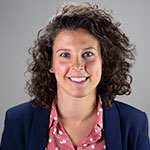 Inmaculada Pedraza Navarro
Profesora
Professor
Doctora en Educación por la Universidad de Sevilla. Máster en Dirección, Evaluación y Calidad de las Instituciones de Formación (Universidad de Sevilla); Licenciada en Antropología Social y Cultural (Universidad de Sevilla); y Diplomada en Magisterio (Universidad de Huelva).
Trabaja como personal docente en la Universidad Antonio de Nebrija, coordinando el área de calidad en la Facultad de Lenguas y Educación, y dirigiendo el Máster Universitario en Procesos Educativos de Enseñanza y Aprendizaje.
A su vez, forma parte del grupo de investigación GIETE y grupo de investigación CEDI. Sus principales líneas de investigación giran en torno a la intervención y evaluación educativa. Ha colaborado en diversos proyectos académicos europeos como STAY-IN (Ref: 526600-LLP-1-2012-IT-Erasmus-Esin); ha generado material docente para la formación investigadora (3er plan de docencia-US-Ref. 1.2.3B); ha participado en diversos congresos nacionales e internacionales; y ha publicado artículos científicos sobre intervención y evaluación educativa.
Inmaculada Pedraza Navarro
Profesora
Professor
Doctora en Educación por la Universidad de Sevilla. Máster en Dirección, Evaluación y Calidad de las Instituciones de Formación (Universidad de Sevilla); Licenciada en Antropología Social y Cultural (Universidad de Sevilla); y Diplomada en Magisterio (Universidad de Huelva).
Trabaja como personal docente en la Universidad Antonio de Nebrija, coordinando el área de calidad en la Facultad de Lenguas y Educación, y dirigiendo el Máster Universitario en Procesos Educativos de Enseñanza y Aprendizaje.
A su vez, forma parte del grupo de investigación GIETE y grupo de investigación CEDI. Sus principales líneas de investigación giran en torno a la intervención y evaluación educativa. Ha colaborado en diversos proyectos académicos europeos como STAY-IN (Ref: 526600-LLP-1-2012-IT-Erasmus-Esin); ha generado material docente para la formación investigadora (3er plan de docencia-US-Ref. 1.2.3B); ha participado en diversos congresos nacionales e internacionales; y ha publicado artículos científicos sobre intervención y evaluación educativa.
ipedraza@nebrija.es
 Manuela Pedregal Valle
Profesora
Professor
Doctora en Ciencias de la Educación por la Universidad Autónoma de Madrid. Máster de Formación de Profesorado en Educación Secundaria por la Universidad Alfonso X el Sabio. Licenciada en Ciencias Geológicas por la Universidad Complutense de Madrid con especialidad en Paleontología. Su línea de investigación se centra en la Pedagogía de la muerte en el contexto educativo. Miembro del Grupo de Investigación P.F.C. (Pedagogía, Formación y Conciencia) de la Universidad Autónoma de Madrid. Ha sido investigadora en Proyectos i+D+I (Ministerio de Ciencia, Economía y Competitividad de España). Autora de diversos trabajos y presentaciones en congresos y seminarios, ha combinado su faceta investigadora con la docencia en la etapa de Educación Secundaria y Bachillerato. Actualmente también es profesora en los Grados de Educación Infantil.
Manuela Pedregal Valle
Profesora
Professor
Doctora en Ciencias de la Educación por la Universidad Autónoma de Madrid. Máster de Formación de Profesorado en Educación Secundaria por la Universidad Alfonso X el Sabio. Licenciada en Ciencias Geológicas por la Universidad Complutense de Madrid con especialidad en Paleontología. Su línea de investigación se centra en la Pedagogía de la muerte en el contexto educativo. Miembro del Grupo de Investigación P.F.C. (Pedagogía, Formación y Conciencia) de la Universidad Autónoma de Madrid. Ha sido investigadora en Proyectos i+D+I (Ministerio de Ciencia, Economía y Competitividad de España). Autora de diversos trabajos y presentaciones en congresos y seminarios, ha combinado su faceta investigadora con la docencia en la etapa de Educación Secundaria y Bachillerato. Actualmente también es profesora en los Grados de Educación Infantil.
mpedregal@nebrija.es
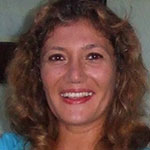 Verónica Pensosi
Profesora
Professor
Licenciada Cum Laude en Filosofía y Letras por la Universidad de La Sapienza (Roma), y en Periodismo por la Universidad Complutense de Madrid, tiene además un Máster en Dirección de Proyectos Culturales. Dispone una sólida carrera profesional desempeñada en sectores sociales, culturales y educativos de distintos países durante más de quince años. Ha sido responsable de comunicación en la FAO de Naciones Unidas durante siete años en Italia, Kenia y Senegal. Posteriormente, ha sido gerente de proyectos en una fundación dedicada a poner la tecnología al servicio de las personas en riesgo de exclusión. Ha impartido seminarios en tecnología aplicada a la inclusión en colegios, universidades y congresos en España, Europa e Iberoamérica en inglés, español, italiano y francés. Es experta en técnicas de storytelling aplicadas a la divulgación del conocimiento y colabora regularmente con distintas universidades para enriquecer la enseñanza con creatividad.
Verónica Pensosi
Profesora
Professor
Licenciada Cum Laude en Filosofía y Letras por la Universidad de La Sapienza (Roma), y en Periodismo por la Universidad Complutense de Madrid, tiene además un Máster en Dirección de Proyectos Culturales. Dispone una sólida carrera profesional desempeñada en sectores sociales, culturales y educativos de distintos países durante más de quince años. Ha sido responsable de comunicación en la FAO de Naciones Unidas durante siete años en Italia, Kenia y Senegal. Posteriormente, ha sido gerente de proyectos en una fundación dedicada a poner la tecnología al servicio de las personas en riesgo de exclusión. Ha impartido seminarios en tecnología aplicada a la inclusión en colegios, universidades y congresos en España, Europa e Iberoamérica en inglés, español, italiano y francés. Es experta en técnicas de storytelling aplicadas a la divulgación del conocimiento y colabora regularmente con distintas universidades para enriquecer la enseñanza con creatividad.
vpensosi@nebrija.es
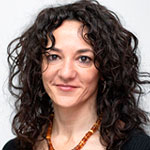 María Paz Peña García
Profesora
Professor
Doctora en Antropología y Trabajo Social y Licenciada en Pedagogía por la Universidad de Granada. Su investigación se enfoca en temas de Educación Intercultural, mediación, etnicidad, identidades, interseccionalidad y género, así como en la investigación e implementación de metodologías activas y emergentes para la inclusión. Es miembro activo del Grupo de Investigación Social Media y Educación Mediática Inclusiva y Ubicua (SMEMIU) en Madrid, así como del grupo de investigación “Innovación y mejora de la educación en Andalucía (HUM126)”. Además, ha participado como investigadora en varios proyectos europeos y de I+D, incluyendo el proyecto Knowledge Building Andalucía. También es autora de diversos artículos y capítulos de libros publicados en revistas y libros reconocidos en los campos de estudio.
María Paz Peña García
Profesora
Professor
Doctora en Antropología y Trabajo Social y Licenciada en Pedagogía por la Universidad de Granada. Su investigación se enfoca en temas de Educación Intercultural, mediación, etnicidad, identidades, interseccionalidad y género, así como en la investigación e implementación de metodologías activas y emergentes para la inclusión. Es miembro activo del Grupo de Investigación Social Media y Educación Mediática Inclusiva y Ubicua (SMEMIU) en Madrid, así como del grupo de investigación “Innovación y mejora de la educación en Andalucía (HUM126)”. Además, ha participado como investigadora en varios proyectos europeos y de I+D, incluyendo el proyecto Knowledge Building Andalucía. También es autora de diversos artículos y capítulos de libros publicados en revistas y libros reconocidos en los campos de estudio.
mpenaga@nebrija.es
 Álvaro Peralta Conde
Profesor
Professor
Licenciado en Física por la Universidad de Sevilla, Doctor en Física por la Technische Universität Kaiserslautern (Alemania), y actualmente terminando los estudios de Matemáticas por la Universidad Nacional de Educación a Distancia. Supervisor de Rayos X industriales por el Consejo de Seguridad Nuclear. Evaluador nacional de la Agencia Nacional de Evaluación y Prospectiva. Experto en tecnología láser. Autor de más de 35 publicaciones científicas y dos patentes. Acreditado por la ANECA a las figuras de contratado doctor, ayudante doctor y profesor de Universidad privada, y actualmente en trámites para conseguir la acreditación de profesor titular de Universidad. En posesión del certificado I3 otorgado por el Ministerio de Ciencia e Innovación. Amplia experiencia docente tanto en grado como postgrado focalizada especialmente a la Didáctica de las Matemáticas y de las Ciencias Experimentales. Más de 50 TFMs y TFGs dirigidos en estas áreas de conocimiento.
Álvaro Peralta Conde
Profesor
Professor
Licenciado en Física por la Universidad de Sevilla, Doctor en Física por la Technische Universität Kaiserslautern (Alemania), y actualmente terminando los estudios de Matemáticas por la Universidad Nacional de Educación a Distancia. Supervisor de Rayos X industriales por el Consejo de Seguridad Nuclear. Evaluador nacional de la Agencia Nacional de Evaluación y Prospectiva. Experto en tecnología láser. Autor de más de 35 publicaciones científicas y dos patentes. Acreditado por la ANECA a las figuras de contratado doctor, ayudante doctor y profesor de Universidad privada, y actualmente en trámites para conseguir la acreditación de profesor titular de Universidad. En posesión del certificado I3 otorgado por el Ministerio de Ciencia e Innovación. Amplia experiencia docente tanto en grado como postgrado focalizada especialmente a la Didáctica de las Matemáticas y de las Ciencias Experimentales. Más de 50 TFMs y TFGs dirigidos en estas áreas de conocimiento.
aperaltac@nebrija.es
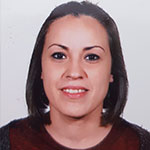 Teresa Rebolledo Gámez
Profesora
Professor
Doctora Cum Laude con Mención Internacional en Desarrollo y Ciudadanía: Derechos Humanos, Igualdad, Educación e Intervención Social, por la Universidad Pablo de Olavide. Premio Extraordinario de Doctorado por la Universidad Pablo de Olavide. Máster en Ciencias Sociales e Intervención Social: Multiculturalismo, Interculturalidad y Diversidad. Diplomada en Educación Social y Diplomada en Trabajo Social. Profesora Asociada LOU del Departamento de Educación y Psicología Social de la Universidad Pablo de Olavide. Gestora de proyectos en la Fundación Universidad Pablo de Olavide, formando parte del equipo de coordinación del Programa Universitario "Aula Abierta de Mayores". Vocal de Junta de Gobierno del Colegio Profesional de Educadoras y Educadores Sociales de Andalucía, responsable de la Vocalía de Formación y Universidad. Miembro del Grupo de Investigación en Acción Socioeducativa (HUM929) de la Universidad Pablo de Olavide. Investigadora en más de 10 proyectos de investigación, nacionales e internacionales. Entre sus líneas de investigación se encuentran la formación superior de profesionales educativos, educación permanente, diversidad, género e interculturalidad. Publicaciones en revistas, capítulos de libros y comunicaciones relacionadas con estas temáticas (https://orcid.org/0000-0002-1425-0743).
Teresa Rebolledo Gámez
Profesora
Professor
Doctora Cum Laude con Mención Internacional en Desarrollo y Ciudadanía: Derechos Humanos, Igualdad, Educación e Intervención Social, por la Universidad Pablo de Olavide. Premio Extraordinario de Doctorado por la Universidad Pablo de Olavide. Máster en Ciencias Sociales e Intervención Social: Multiculturalismo, Interculturalidad y Diversidad. Diplomada en Educación Social y Diplomada en Trabajo Social. Profesora Asociada LOU del Departamento de Educación y Psicología Social de la Universidad Pablo de Olavide. Gestora de proyectos en la Fundación Universidad Pablo de Olavide, formando parte del equipo de coordinación del Programa Universitario "Aula Abierta de Mayores". Vocal de Junta de Gobierno del Colegio Profesional de Educadoras y Educadores Sociales de Andalucía, responsable de la Vocalía de Formación y Universidad. Miembro del Grupo de Investigación en Acción Socioeducativa (HUM929) de la Universidad Pablo de Olavide. Investigadora en más de 10 proyectos de investigación, nacionales e internacionales. Entre sus líneas de investigación se encuentran la formación superior de profesionales educativos, educación permanente, diversidad, género e interculturalidad. Publicaciones en revistas, capítulos de libros y comunicaciones relacionadas con estas temáticas (https://orcid.org/0000-0002-1425-0743).
trebolledo@nebrija.es
 Teresa Rossignoli Palomeque
Profesora
Professor
Doctora en Psicología por la Universidad Complutense de Madrid (2020). Máster en Neuropsicología Infantil (2010-2012 UCM). Ldo. Psicopedagogía (2010 UCM). Experiencia como personal docente-investigador en el Centro Universitario Cardenal Cisneros, profesora asociada en la Universidad Autónoma de Madrid, y docente en Master de Neurospicología en la Universidad Operta de Catalunya. A su vez, cuenta con amplia experiencia en intervención neuropsicológica y coordinación del dto. de Neuropsicología Infantil en el Centro Comunica. Investigación orientada especialmente al entrenamiento cognitivo de la atención y de las funciones ejecutivas en población escolar, entre los que destaca: (1) Rossignoli-Palomeque, T., Perez-Hernandez, E., & González Marqués, J. (2018). Brain training in children and adolescents: Is it scientifically valid? Frontiers in Psychology, 9, 565. (2) Rossignoli, T, Perez-Hernandez, E., Quiros-Godoy, M., González Marqués, J (2019) Schoolchildren’s compensatory strategies during an Executive Function App Training. Frontiers in Psychology 10, 2332. (3) Rossignoli, T, Perez-Hernandez, E., González Marqués, J. (2020) Training effects on attention and EF strategy-based training “Nexxo” in school-age students. Acta Psychologica 210, 103174.
Teresa Rossignoli Palomeque
Profesora
Professor
Doctora en Psicología por la Universidad Complutense de Madrid (2020). Máster en Neuropsicología Infantil (2010-2012 UCM). Ldo. Psicopedagogía (2010 UCM). Experiencia como personal docente-investigador en el Centro Universitario Cardenal Cisneros, profesora asociada en la Universidad Autónoma de Madrid, y docente en Master de Neurospicología en la Universidad Operta de Catalunya. A su vez, cuenta con amplia experiencia en intervención neuropsicológica y coordinación del dto. de Neuropsicología Infantil en el Centro Comunica. Investigación orientada especialmente al entrenamiento cognitivo de la atención y de las funciones ejecutivas en población escolar, entre los que destaca: (1) Rossignoli-Palomeque, T., Perez-Hernandez, E., & González Marqués, J. (2018). Brain training in children and adolescents: Is it scientifically valid? Frontiers in Psychology, 9, 565. (2) Rossignoli, T, Perez-Hernandez, E., Quiros-Godoy, M., González Marqués, J (2019) Schoolchildren’s compensatory strategies during an Executive Function App Training. Frontiers in Psychology 10, 2332. (3) Rossignoli, T, Perez-Hernandez, E., González Marqués, J. (2020) Training effects on attention and EF strategy-based training “Nexxo” in school-age students. Acta Psychologica 210, 103174.
trossignoli@nebrija.es
 Miguel Ángel Ruiz Domínguez
Profesor
Professor
Miguel Ángel Ruiz Domínguez es doctor en Educación. Docente universitario en la UNIR y en la Universidad Nebrija en las especialidades de didáctica de las matemáticas, redes sociales y comunicación y tecnologías educativas.
Dirige el portal educativo Yo Soy Tu Profe, referencia en el sector con más de un millón de visitas mensuales y distintos reconocimientos públicos. Además, ha colaborado con distintos medios de comunicación divulgando aspectos pedagógicos y ha presentado en RTVE los programas educativos de Aprendemos en Casa y Aprendemos en Clan, con contenidos matemáticos.
Miguel Ángel Ruiz Domínguez
Profesor
Professor
Miguel Ángel Ruiz Domínguez es doctor en Educación. Docente universitario en la UNIR y en la Universidad Nebrija en las especialidades de didáctica de las matemáticas, redes sociales y comunicación y tecnologías educativas.
Dirige el portal educativo Yo Soy Tu Profe, referencia en el sector con más de un millón de visitas mensuales y distintos reconocimientos públicos. Además, ha colaborado con distintos medios de comunicación divulgando aspectos pedagógicos y ha presentado en RTVE los programas educativos de Aprendemos en Casa y Aprendemos en Clan, con contenidos matemáticos.
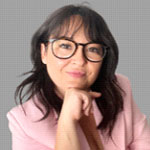 María del Pilar Salvá Soria
Profesora
Professor
Filosofía y Educación. Doctora acreditada en Filosofía (Epistemología) con Mención Internacional por la Universidad Complutense de Madrid. Máster en Epistemología de las Ciencias Naturales y las Ciencias Sociales (UCM), Máster Propio en Ciencia y Filosofía: Construyendo el Futuro (UCM). Máster en Profesorado de Educación Secundaria Obligatoria y Bachillerato (Universidad Pontificia Comillas).
Ha trabajado en diversas etapas educativas desde Secundaria y Bachillerato hasta docencia universitaria en Grado, Máster, Doctorado y Universidad de Mayores. Actualmente imparto docencia y coordinación en la Facultad de Lenguas y Educación de Universidad Nebrija en el Máster de Formación del Profesorado y en el Doble Grado de Psicología y Primaria.
Pertenece al grupo de investigación financiado por el Ministerio, Cognitive Vulnerability, Verisimilitude and Truth (FFI2017-84826-P). Ha sido fundadora y presidenta de la Asociación de Epistemología (UCM). Actualmente publica en distintas editoriales y revistas científicas de reconocido prestigio.
María del Pilar Salvá Soria
Profesora
Professor
Filosofía y Educación. Doctora acreditada en Filosofía (Epistemología) con Mención Internacional por la Universidad Complutense de Madrid. Máster en Epistemología de las Ciencias Naturales y las Ciencias Sociales (UCM), Máster Propio en Ciencia y Filosofía: Construyendo el Futuro (UCM). Máster en Profesorado de Educación Secundaria Obligatoria y Bachillerato (Universidad Pontificia Comillas).
Ha trabajado en diversas etapas educativas desde Secundaria y Bachillerato hasta docencia universitaria en Grado, Máster, Doctorado y Universidad de Mayores. Actualmente imparto docencia y coordinación en la Facultad de Lenguas y Educación de Universidad Nebrija en el Máster de Formación del Profesorado y en el Doble Grado de Psicología y Primaria.
Pertenece al grupo de investigación financiado por el Ministerio, Cognitive Vulnerability, Verisimilitude and Truth (FFI2017-84826-P). Ha sido fundadora y presidenta de la Asociación de Epistemología (UCM). Actualmente publica en distintas editoriales y revistas científicas de reconocido prestigio.
msalva@nebrija.es
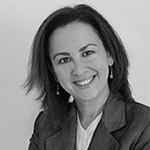 Patricia Sánchez Holgado
Profesora
Professor
Doctora en Formación en la Sociedad del Conocimiento por la Universidad de Salamanca. Profesora del Máster en Metodologías Docentes y del Máster en Tecnologías de la Información y la Comunicación para la Educación y Aprendizaje Digital en la Universidad Nebrija. Directora de Comunicación e Innovación de la agencia de publicidad tthegap y responsable del Laboratorio de investigación. Es personal investigador postdoctoral en la Universidad de Salamanca y miembro del Grupo de Investigación Reconocido Observatorio de los Contenidos Audiovisuales (OCA). Licenciada en Publicidad y Relaciones públicas por la Universidad Complutense de Madrid, completando su formación con Periodismo. Postgrado en Dirección y Gestión de empresas por la Universidad Politécnica de Catalunya, postgrado en Big Data por la Universidad Pontificia de Salamanca, máster en Estudios de la Ciencia, la Tecnología y la Innovación por la Universidad de Oviedo y máster universitario en Formación del Profesorado de Educación Secundaria Obligatoria y Bachillerato, Formación Profesional y Enseñanzas de Idiomas. Profesora asociada en la Facultad de Lenguas y Educación de la Universidad Nebrija de Madrid y en la Facultad de Comunicación de la Universidad Pontificia de Salamanca. Líneas de Investigación: Adopción de tecnologías, comunicación de la ciencia, narrativas transmedia, big data e inteligencia artificial en comunicación social, perspectiva de género en divulgación científica y métodos computacionales de investigación en ciencias sociales.
Patricia Sánchez Holgado
Profesora
Professor
Doctora en Formación en la Sociedad del Conocimiento por la Universidad de Salamanca. Profesora del Máster en Metodologías Docentes y del Máster en Tecnologías de la Información y la Comunicación para la Educación y Aprendizaje Digital en la Universidad Nebrija. Directora de Comunicación e Innovación de la agencia de publicidad tthegap y responsable del Laboratorio de investigación. Es personal investigador postdoctoral en la Universidad de Salamanca y miembro del Grupo de Investigación Reconocido Observatorio de los Contenidos Audiovisuales (OCA). Licenciada en Publicidad y Relaciones públicas por la Universidad Complutense de Madrid, completando su formación con Periodismo. Postgrado en Dirección y Gestión de empresas por la Universidad Politécnica de Catalunya, postgrado en Big Data por la Universidad Pontificia de Salamanca, máster en Estudios de la Ciencia, la Tecnología y la Innovación por la Universidad de Oviedo y máster universitario en Formación del Profesorado de Educación Secundaria Obligatoria y Bachillerato, Formación Profesional y Enseñanzas de Idiomas. Profesora asociada en la Facultad de Lenguas y Educación de la Universidad Nebrija de Madrid y en la Facultad de Comunicación de la Universidad Pontificia de Salamanca. Líneas de Investigación: Adopción de tecnologías, comunicación de la ciencia, narrativas transmedia, big data e inteligencia artificial en comunicación social, perspectiva de género en divulgación científica y métodos computacionales de investigación en ciencias sociales.
psanchezh@nebrija.es
 Saida Santana
Profesora
Professor
Doctora (URJC), licenciada en Periodismo (UCM), Máster en Artes Escénicas (URJC), Máster en coaching personal y ejecutivo (UCJC). Combina la docencia en UNNE y la New York Film Academy en Los Ángeles con el coaching, la escritura y la actuación. Ha sido presentadora de los programas de televisión 40 años de TVE en Canarias e Ida y vuelta, formato de entrevistas a personajes célebres de la cultura por todo el mundo y coordinadora de guion en TVE del programa de entrevistas de Juan Ramón Lucas En noches como ésta. Guionista de entretenimiento y ficción de El Terrat, Telemundo NBC y coach en films como “Invasor” o “Tormenta” para Antena 3. Como actriz ha protagonizado series y películas en España y Estados Unidos y es autora, directora escénica y creadora de las performances “Poemas visuales”, “dentro”, “La Indiana”, “Retazos”. Sus artículos, capítulos de libro y conferencias versan sobre el lenguaje audiovisual y el performance.
Saida Santana
Profesora
Professor
Doctora (URJC), licenciada en Periodismo (UCM), Máster en Artes Escénicas (URJC), Máster en coaching personal y ejecutivo (UCJC). Combina la docencia en UNNE y la New York Film Academy en Los Ángeles con el coaching, la escritura y la actuación. Ha sido presentadora de los programas de televisión 40 años de TVE en Canarias e Ida y vuelta, formato de entrevistas a personajes célebres de la cultura por todo el mundo y coordinadora de guion en TVE del programa de entrevistas de Juan Ramón Lucas En noches como ésta. Guionista de entretenimiento y ficción de El Terrat, Telemundo NBC y coach en films como “Invasor” o “Tormenta” para Antena 3. Como actriz ha protagonizado series y películas en España y Estados Unidos y es autora, directora escénica y creadora de las performances “Poemas visuales”, “dentro”, “La Indiana”, “Retazos”. Sus artículos, capítulos de libro y conferencias versan sobre el lenguaje audiovisual y el performance.
ssantana@nebrija.es
 Uriel Seguí
Profesor
Professor
Doctor Arquitecto por la Universidad Politécnica de Madrid desde 2005. Ha sido quince años profesor de Análisis de Formas Arquitectónicas, Dibujo para el proyecto arquitectónico, Dibujo del Natural y Dibujo Avanzado en la Universidad Camilo José Cela. Ejerció el cargo de coordinador del área de expresión gráfica de su departamento durante diez años, y durante dicho periodo dirigió 30 Proyectos Fin de Carrera. Ha sido miembro activo del grupo de investigación subvencionado “HYPERMEDIA” de la ETSAM, y fue Director del grupo de investigación “REGENERA” (recursos estructurales para la gestión eficiente natural y estética de sistemas de conservación de biodiversidad y restauración ambiental) subvencionado por la Institución Educativa SEK. Ha sido siete años profesor de pintura contrarrepresentativa en el Círculo de Bellas Artes de Madrid. La universidad UCJC Publica su Tesis Doctoral: Borrar: acción espaciadora y en paralelo él publica dos libros con Ediciones Mairea: Tanteos visuales y sonoros, y Él, retrato relato. Desde el comienzo de este curso es profesor de la asignatura: Expresión Gráfica 1 y 2, del doble grado de Bellas Artes y Diseño de interiores de la Universidad Antonio de Nebrija, y desde marzo imparte en el Master de Magisterio de dicha Universidad, la asignatura: Didáctica de las artes plásticas y visuales: estrategias y metodologías, a la par de ser tutor del TFM de dicho Master. Desde hace treinta años desarrolla una investigación plástica, sonora y audiovisual que le ha llevado participar en numerosos concursos de diferentes ámbitos, y a exponer sus producciones artísticas en numerosas galerías españolas, y de países como Alemania, Italia, Turquía, Reino Unido, Israel y Estados Unidos.
Uriel Seguí
Profesor
Professor
Doctor Arquitecto por la Universidad Politécnica de Madrid desde 2005. Ha sido quince años profesor de Análisis de Formas Arquitectónicas, Dibujo para el proyecto arquitectónico, Dibujo del Natural y Dibujo Avanzado en la Universidad Camilo José Cela. Ejerció el cargo de coordinador del área de expresión gráfica de su departamento durante diez años, y durante dicho periodo dirigió 30 Proyectos Fin de Carrera. Ha sido miembro activo del grupo de investigación subvencionado “HYPERMEDIA” de la ETSAM, y fue Director del grupo de investigación “REGENERA” (recursos estructurales para la gestión eficiente natural y estética de sistemas de conservación de biodiversidad y restauración ambiental) subvencionado por la Institución Educativa SEK. Ha sido siete años profesor de pintura contrarrepresentativa en el Círculo de Bellas Artes de Madrid. La universidad UCJC Publica su Tesis Doctoral: Borrar: acción espaciadora y en paralelo él publica dos libros con Ediciones Mairea: Tanteos visuales y sonoros, y Él, retrato relato. Desde el comienzo de este curso es profesor de la asignatura: Expresión Gráfica 1 y 2, del doble grado de Bellas Artes y Diseño de interiores de la Universidad Antonio de Nebrija, y desde marzo imparte en el Master de Magisterio de dicha Universidad, la asignatura: Didáctica de las artes plásticas y visuales: estrategias y metodologías, a la par de ser tutor del TFM de dicho Master. Desde hace treinta años desarrolla una investigación plástica, sonora y audiovisual que le ha llevado participar en numerosos concursos de diferentes ámbitos, y a exponer sus producciones artísticas en numerosas galerías españolas, y de países como Alemania, Italia, Turquía, Reino Unido, Israel y Estados Unidos.
usegui@nebrija.es
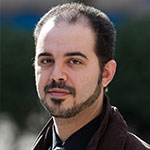 José Mª Suárez Díez
Profesor
Professor
Doctor en Literatura española del Siglo de Oro por la Universidad Autónoma de Madrid y Licenciado en Filología Hispánica por la misma universidad. Desde 2015, desempeña su labor principal como docente de Secundaria y Bachillerato en el Colegio de Fomento “Las Tablas Valverde” de Madrid, e imparte la asignatura de Lengua castellana y literatura en ESO, así como la asignatura de Latín en 4º de la ESO. Ha desarrollado su currículo investigador mediante publicaciones de crítica literaria en revistas especializadas, centrándose en períodos literarios como el Siglo de Oro y el Romanticismo. Ha participado en numerosos congresos, tanto en el extranjero en la UNAM, como en España, en la UCM, o en la UVa. Ha impartido seminarios para el Proyecto de Investigación I+D+i “Antropología mítica contemporánea”; y colaborado en libros de autoría colectiva: «Mito y mundo contemporáneo. La recepción de los mitos antiguos, medievales y modernos», (coord.) José Manuel Losada Goya, ed. Levante; o “La corte del Barroco. Textos literarios, avisos, manuales de corte y oratoria”, (coord.) A. Rey Hazas, M. de la Campa y E. Jiménez Pablo, ed. Polifemo, Madrid; entre otros.
Fue galardonado con el I Premio de Ensayo, en 2010, por la STE.
José Mª Suárez Díez
Profesor
Professor
Doctor en Literatura española del Siglo de Oro por la Universidad Autónoma de Madrid y Licenciado en Filología Hispánica por la misma universidad. Desde 2015, desempeña su labor principal como docente de Secundaria y Bachillerato en el Colegio de Fomento “Las Tablas Valverde” de Madrid, e imparte la asignatura de Lengua castellana y literatura en ESO, así como la asignatura de Latín en 4º de la ESO. Ha desarrollado su currículo investigador mediante publicaciones de crítica literaria en revistas especializadas, centrándose en períodos literarios como el Siglo de Oro y el Romanticismo. Ha participado en numerosos congresos, tanto en el extranjero en la UNAM, como en España, en la UCM, o en la UVa. Ha impartido seminarios para el Proyecto de Investigación I+D+i “Antropología mítica contemporánea”; y colaborado en libros de autoría colectiva: «Mito y mundo contemporáneo. La recepción de los mitos antiguos, medievales y modernos», (coord.) José Manuel Losada Goya, ed. Levante; o “La corte del Barroco. Textos literarios, avisos, manuales de corte y oratoria”, (coord.) A. Rey Hazas, M. de la Campa y E. Jiménez Pablo, ed. Polifemo, Madrid; entre otros.
Fue galardonado con el I Premio de Ensayo, en 2010, por la STE.
jsuarez@nebrija.es
 Tania Ugena Candel
Profesora
Professor
Doctora en Ciencias de la Educación por la Universidad Complutense de Madrid.Diplomada en Educación Social. Licenciada en Antropología Social y Cultural. Máster en Arteterapia y Educación Artística para la Inclusión Social. Formación en Danza Española, Baile Flamenco y Danza Clásica en el Centro de Arte Flamenco y Danza Española Amor de Dios (Madrid). Profesora del Grado de Artes Escénicas de la Universidad Nebrija y del Instituto Nebrija de Competencias Profesionales; Educadora del Programa “El Prado para Todos” – Área de Educación del Museo Nacional del Prado; Creadora de Girasol Arteterapia en Movimiento. Experiencia con: Infancia, Adolescencia, Familias, Mujeres, Salud Mental, Personas Mayores, Enfermedad de Alzheimer, Comunidad Gitana, Migrantes, Diversidad Funcional Cognitiva y Sensorial, Educación Afectivo-Sexual y Adicciones. Ha publicado en diferentes libros, revistas y actas de congresos, en relación con la educación, las artes y la arteterapia.
Tania Ugena Candel
Profesora
Professor
Doctora en Ciencias de la Educación por la Universidad Complutense de Madrid.Diplomada en Educación Social. Licenciada en Antropología Social y Cultural. Máster en Arteterapia y Educación Artística para la Inclusión Social. Formación en Danza Española, Baile Flamenco y Danza Clásica en el Centro de Arte Flamenco y Danza Española Amor de Dios (Madrid). Profesora del Grado de Artes Escénicas de la Universidad Nebrija y del Instituto Nebrija de Competencias Profesionales; Educadora del Programa “El Prado para Todos” – Área de Educación del Museo Nacional del Prado; Creadora de Girasol Arteterapia en Movimiento. Experiencia con: Infancia, Adolescencia, Familias, Mujeres, Salud Mental, Personas Mayores, Enfermedad de Alzheimer, Comunidad Gitana, Migrantes, Diversidad Funcional Cognitiva y Sensorial, Educación Afectivo-Sexual y Adicciones. Ha publicado en diferentes libros, revistas y actas de congresos, en relación con la educación, las artes y la arteterapia.
tugena@nebrija.es
 Cristina Villalonga
Profesora
Professor
Doctora en Comunicación y Educación en Entornos Digitales, Máster en Comunicación y Educación en la Red y Máster en Redes Sociales y Aprendizaje Digital por la UNED y Licenciada en Periodismo por la UAB. Su actividad profesional e investigadora gira en torno a dos ejes: el desarrollo de competencias mediáticas y digitales y las metodologías de enseñanza y aprendizaje e-Learning , b-Learning e híbridas, centrándose en el empoderamiento mediático y digital a través de la renovación pedagógica. Forma parte del Grupo de Investigación Nebrija en Cognición, Educación y Diferencias Individuales y colabora con el Grupo de Investigación en Comunicación e Información Digital (GICID) de la Universidad de Zaragoza. Es directora de la unidad e-Learning de la Universidad Nebrija, siendo responsable de la Organización, Metodología e Innovación Docente del mismo departamento. En este ámbito ha puesto en marcha un modelo de educación digital que cuenta con numerosos reconocimientos, como el Premio de Excelencia Educativa 2017 a la Mejor Universidad Online, otorgado por la Fundación Mundo Ciudad. Cuenta con el Diploma en Alta Dirección de Universidades y es representante en el Grupo de Trabajo en Formación Online y Tecnología Educativa (FOLTE) de la Sectorial CRUE-TIC, colaborando en los proyectos relacionados con la Competencia Digital Docente y la Formación EdTech.
Cristina Villalonga
Profesora
Professor
Doctora en Comunicación y Educación en Entornos Digitales, Máster en Comunicación y Educación en la Red y Máster en Redes Sociales y Aprendizaje Digital por la UNED y Licenciada en Periodismo por la UAB. Su actividad profesional e investigadora gira en torno a dos ejes: el desarrollo de competencias mediáticas y digitales y las metodologías de enseñanza y aprendizaje e-Learning , b-Learning e híbridas, centrándose en el empoderamiento mediático y digital a través de la renovación pedagógica. Forma parte del Grupo de Investigación Nebrija en Cognición, Educación y Diferencias Individuales y colabora con el Grupo de Investigación en Comunicación e Información Digital (GICID) de la Universidad de Zaragoza. Es directora de la unidad e-Learning de la Universidad Nebrija, siendo responsable de la Organización, Metodología e Innovación Docente del mismo departamento. En este ámbito ha puesto en marcha un modelo de educación digital que cuenta con numerosos reconocimientos, como el Premio de Excelencia Educativa 2017 a la Mejor Universidad Online, otorgado por la Fundación Mundo Ciudad. Cuenta con el Diploma en Alta Dirección de Universidades y es representante en el Grupo de Trabajo en Formación Online y Tecnología Educativa (FOLTE) de la Sectorial CRUE-TIC, colaborando en los proyectos relacionados con la Competencia Digital Docente y la Formación EdTech.
cvillalo@nebrija.es
More Academic Information
Competences
Basic CompetencesIn accordance with Royal Decree 43/2015 and Royal Decree 861/2010, which modifies Royal Decree 1393/2007, of October 29, which establishes the organization of official university education, as well as the Royal Decree 1027/2011, which establishes the Spanish Qualifications Framework for Higher Education (MECES), Master's degrees must guarantee the acquisition of the following basic competences:
- BC6 Possess and understand knowledge that provides a basis or opportunity to be original in the development and/or application of ideas, often in a research context.
- BC7 Students know how to apply the knowledge acquired and their ability to solve problems in new or unfamiliar environments within broader (or multidisciplinary) contexts related to their area of study.
- BC8 Students are able to integrate knowledge and face the complexity of formulating judgments based on information that, even if incomplete or limited, includes reflections on social and ethical responsibilities linked to the application of their knowledge and judgments.
- BC9 Students know how to communicate their conclusions and the knowledge and ultimate reasons that support them to specialized and non-specialized audiences in a clear and unambiguous way.
- BC10 Students possess the learning skills that allow them to continue studying in a way that will be largely self-directed or autonomous.
- GC1 Apply the knowledge acquired on methodologies of the 21st-century teaching paradigm to the different modalities and environments of education, contexts and modalities of the teacher's habitual practice.
- GC2 Identify and understand the theories, models, pedagogical roles and teaching methodologies through the prism of digital, liquid and mediated pedagogy.
- GC3 Understand and apply the Teacher's Digital Competences Framework to practice and promote, through them, their pedagogical leadership and the updating of their professional profile.
- GC4 Know the new digital environments and the mediated and virtual training modalities in which the practical teaching methodologies of the 21st century are developed, new current methodological paradigm.
- GC5 Select and use teaching methodological resources based on TAC (Learning and Knowledge Technologies), aimed at improving training and teaching-learning processes.
- GC6 Understand educommunicative practices and apply them to the design and implementation of mediated teaching methodologies and strategies.
- GC7 Select the most appropriate methodologies, through grounded approaches, and adapt them according to their purpose, recipients and training context.
- GC8. Know the evaluation process in the methodological design and use different types of competence evaluation, based on mediated resources and instruments. Understand and use different types of evaluation in teaching methodologies, based on resources and instruments mediated and adapted to the competencies model, which allows making professional and pertinent value judgments.
- GC9 Apply the theory the methodological keys to the design of hybrid models, based on the micro (subject or topic) and macro (institution) perspectives, supported by cooperative, mediated and interactive strategies.
- GC10 Design and apply teaching methodologies and strategies based on investment and gamification of education and training processes in mediated contexts.
- GC11 Create, organize and manage good teaching practices based on innovative methodologies and strategies, guided by TAC (Learning and Knowledge Technologies) and based on virtual environments and platforms.
- SC1 Analyze and assess the main characteristics of the mediated teaching methodologies, strategies and resources and their influence on one's professional profile, on the conception of the didactic act and on the organization of the different educational modalities.
- SC2 Identify the main characteristics of the new role of the teacher and the student in the 21st century, of the digital and mediated teaching methodological paradigm, and of the TACs, and understand their implications in the educational process.
- SC3 Understand and apply educommunicative practices, as well as the precepts of digital and liquid pedagogy, to the methodological design, organization and habitual teaching practices, as a form of leadership and redefinition of one's own professional teaching profile.
- SC4 Know and interpret the main elements of the evaluation of the different teaching methodologies and strategies, in particular of rubrics, e-rubrics and other innovative forms of evaluation, to integrate them into the teacher's methodological design process.
- SC5 Analyze and understand experiences of good teaching methodological practices, based on the TACs (Learning and Knowledge Technologies) and on the mediated contexts, which may be applicable to other modalities and environments.
- SC6 Use teaching methodologies that facilitate the acquisition of students' digital skills and their empowerment through them. Apply pedagogical practices that facilitate the acquisition of digital and media skills, and dynamics that allow the exercise of pedagogical leadership in the classroom.
- SC7 Understand and discern, at an advanced level, between the different teaching methodologies and strategies, and use the appropriate mediated pedagogical resources for each methodological purpose.
- SC8 Adapt traditional teaching methodologies to the new characteristics of the student and of digital and mediated education, through gamification, investment of learning and the redefinition of active and participatory teaching.
- SC9 Analyze and evaluate the educational implications of teaching environments and digital and mediated resources in the design of teaching methodologies. Evaluate in a well-founded and critical way the educational, communicative and technological implications and consequences of the mediated pedagogical environments and resources, the apps and the social media, typical of the teaching methodological paradigm of the 21st century.
- SC10 Understand the keys that allow the design of hybrid models that combine different teaching methodologies and strategies that can be used in different contexts, stages and training modalities.
- SC11 Design proposals for innovative and mediated teaching methodologies, according to the characteristics and diversity of the students, and adaptable to the two modalities: face-to-face and online.
- SC12 Observe experiences of good teaching practices in real contexts, which allows for the identification and analysis of innovative and differential methodological elements, which provide them with higher quality.
- SC13 Incorporate the knowledge, resources, strategies and competences acquired in the Master's Degree in Teaching Methodologies, to the development of an educational innovation or research work (FRP), directly related to some of the subjects or topics, and defend it publicly before a public tribunal.
Online Study
Admission
Admission profile
Individuals interested in pursuing the Master's degree in Teaching Methodologies at Antonio de Nebrija University must fulfill the requirements outlined by current legislation. The entry profile necessitates candidates to hold a university degree or its equivalent (such as undergraduate or associate degrees) in Teaching, Pedagogy, Psychology (with a specialization in education), or Psychopedagogy.
Moreover, due to the interdisciplinary nature of the program, individuals who have completed the Master's Degree in Teacher Training for Compulsory Secondary Education and Baccalaureate, Vocational Training and Language Teaching, or possess the Certificate of Pedagogical Aptitude (CAP), as well as practicing teachers and university doctors, are eligible to apply for the Master's Degree.
For university graduates outside the field of education or graduates of the Master's Degree in Teacher Training, Antonio de Nebrija University will provide and require additional training components to ensure that all students entering this program possess the necessary foundational knowledge.
The profile will be that of an educator who, equipped with an understanding of the latest methodological approaches and possessing a digital-proficient profile, can foster educational environments conducive to teaching across various modalities and learning contexts. Additionally, they will skillfully select the most appropriate resources, strategies, and methods to ensure the academic success of their students.
As per the provisions outlined in Article 18 of RD 822/2021 and RD 861/2010, students meeting any of the following criteria may gain access to Master's studies:
- Possession of an official Spanish university degree or a degree issued by a higher education institution in the European Higher Education Area. This degree must authorize access to Master's degrees in the country where it was awarded and must align with the entry profile established for the specific degree program.
- Graduates from educational systems outside the European Higher Education Area may access Master's programs without requiring the homologation of their degrees. However, the University will verify that these graduates demonstrate a level of training equivalent to the corresponding official Spanish university degrees. Additionally, their degrees must entitle them, in the country where they were awarded, to access postgraduate education. It is important to note that admission through this pathway does not imply the homologation or recognition of the previous degree for purposes other than pursuing Master's degrees. In cases where the homologation of any degree, diploma, or study obtained abroad is necessary for University admission, Antonio de Nebrija University may conditionally admit students who provide evidence that they have applied for the necessary approval while the approval procedure is being resolved.
- For students with special educational needs arising from disabilities, the University will evaluate the necessity for possible curricular adaptations, itineraries, or alternative studies.
In addition to meeting the requirements of current legislation, the entry profile for the Master's Degree in Teaching Methodologies at Antonio de Nebrija University must be considered. Applicants eligible for this program include those who possess an associate's, bachelor's or undergraduate degree, or a Master's degree in Teaching, Pedagogy, Psychology (with a mention or specialty in education), or Psychopedagogy. Furthermore, due to the interdisciplinary nature of the program, students who have completed the Master's Degree in Teacher Training for Compulsory Secondary Education and Baccalaureate, Vocational Training and Language Teaching, or those in possession of the Certificate of Pedagogical Aptitude (CAP), as well as practicing teachers and university sector doctors, are also eligible to apply.
For university graduates who are not from the field of education or those who have not completed the Master's Degree in Teacher Training, Antonio de Nebrija University will provide and require supplementary training to ensure all students entering the master's program have the necessary foundational knowledge.
In general, the admission documentation will be submitted to the Admissions Department.
The student must provide the originals or certified copies of the submitted documentation, within a period established by the University, in order to formalize his/her enrollment. Any inaccuracy, falsity or omission of information, statement or document provided by the student in the admission period will entail the impossibility of continuing to exercise the right from the moment the University has proof of these events, and proceed to cancel the application for admission submitted and the place awarded, notwithstanding any criminal, civil or administrative responsibilities that may arise.
In order to access the official master's degrees, it is necessary to submit the following documentation:
- Completed admission application.
- Identification document (D.N.I) or valid passport.
- 1 passport-size photograph.
- Academic transcript with the grades that grant access to the Master's degree.
- Certified photocopy of official Spanish university diploma or receipt of having requested it.
- Registration in social security or employment contract for the profile of university PhD professors.
Foreign students:
- Certified photocopy of official diploma issued by a foreign higher education institution belonging to the European Higher Education Area (EHEA) that grants access, in the issuing country, to official master's degree studies.
- Certified photocopy of official diploma issued in a foreign educational system not belonging to the EHEA. In this case, access will be conditioned by the verification that the studies completed correspond to a level of studies equivalent to that of the official Spanish university degrees and that they grant access to the official master's degrees in the country in which the diploma was issued. This procedure does not imply, in any case, the homologation of the previous degree, nor its recognition for any purpose other than to access the master's studies.
- If necessary, a letter issued by the University in which the student has completed the degree that grants access to Master's studies in the country issuing the diploma.
- Registration in social security or employment contract for the profile of university PhD professors.
In the event that the studies with which the pre-registration for the Master's degree is accessed are completed in a Foreign Higher Education institution, both the diploma and the academic record (grades) must be official and issued by the competent authorities, in accordance with the legal system of the country of origin.
If the number of applicants exceeds the available places, the student's academic record (grade average) will be used as the admission criterion. Therefore, anyone interested in the Master's Degree in Teaching Methodologies must submit their academic record, as the grade average will determine their admission if the number of applications exceeds the available places. Once the places are filled, additional applicants will be placed on a waiting list for any vacancies that may arise before the start of the course, following the admission and selection criteria detailed in point 4 for all other applicants.
Once admitted, the student will proceed to enrollment, which consists of the following phases: Place Reservation: Candidates must reserve a place. This pre-enrollment fee guarantees the candidate's spot at the University. These annual enrollment fees are non-refundable, except for students who are conditionally admitted, do not meet the legal access requirements, or have a justifiable medical situation.
Enrollment
Pre-enrolled candidates who wish to formalize their academic enrollment at the University must follow these steps:
- Submit Documentation: Provide proof that they meet the requirements established by Spanish university legislation for admission to the Master's Degree.
- Formalization of the Online Enrollment Process: The self-enrollment service on the Nebrija website allows admitted students to complete all academic, economic, and administrative procedures within the established deadlines. Along with their admission letter, they will receive the access code and personal password necessary for self-enrollment. Once self-enrollment is completed, the candidate acquires the status of a student at Nebrija University.
- Payment of Enrollment for the academic year according to the chosen payment plan.
In addition to evaluating the academic merits provided by the candidate (which will account for 60% of the admission process), students must complete a personal interview (30%). This interview, conducted by the program director, coordinator, or university advisors, aims to verify the candidate's suitability and alignment with the degree program. It assesses whether the candidate possesses sufficient motivation, training, knowledge, abilities, aptitudes, communication skills, extracurricular activities, and future interests necessary for admission to the postgraduate courses at Nebrija University. Additionally, candidates must submit a presentation document (10%) prepared personally, explaining their motivation and interests in the chosen studies, as well as any other relevant personal circumstances for the selection process.
Non-Spanish-speaking foreign students must take a Spanish language level test to assess their proficiency. However, candidates are exempt from this test if they provide certification of Spanish language knowledge at level B2 of the CEFR. The level accreditation will be validated through official titles accepted by the ACLES and/or Instituto Cervantes certificate validation table.
Employability
Career Opportunities
The Master's Degree in Teaching Methodologies allows the completion of pedagogical and didactic training for graduates of the Master's Degree in Teacher Training, providing a differential milestone in the curriculum vitae, either to compete for tenure in the public sector -with the corresponding score as an official master's degree with 60 ECTS credits-, or to teach in a professional way in the State-assisted and private sector, at a time when 3.0 teachers are increasingly needed, professors who are trained, experienced and competent in innovative teaching methodologies and strategies, as well as in settings, both face-to-face and virtual, for the exercise and professional development of teaching in the 21st century.
More information on Internships in CompaniesTestimonials
University Life in Teaching Methodologies
Visit all the Activities of the School of Language and Education
Let's Talk About Education
Second chapter of the video podcast specialized in Education where emotions in the classroom are discussed and how they affect language learning.

Nebrija, the wise man who loved words
Presentation of the illustrated book on Antonio de Nebrija aimed at children between 8 and 11 years of age. A graphic and educational approach to the life of the father of Spanish grammar. See article

How social networks influence adolescents
Article published by Mónica Moreno, a professor at Nebrija University, on the influence of social networks on students and their direct influence on the learning process.
See article


